:max_bytes(150000):strip_icc():format(webp)/photo-editor-working-on-computer-at-desk-in-office-946928370-5b85791746e0fb0025b40d84.jpg)
New In 2024, The Best Text Animation Software with Motion Tracking

The Best Text Animation Software with Motion Tracking
Best Text Motion Tracking Software

Ollie Mattison
Mar 27, 2024• Proven solutions
Have you ever been mesmerized by a video with text or emoji’s moving together with objects? That effect is produced using motion tracking and isn’t very complicated. Today, we will introduce some text motion tracking software (free & paid) tools that allow you to pin text to video with minimum effort. There will also be detailed tutorials on how to utilize each tool. Let’s get started.
Best Text Motion Tracking Software [+Howtos]
Note: The list below is in no particular order.
1. Filmora
Pricing: Free (watermark) /starts at $49.99/year
Operating System: Windows & Mac
The newly released Wondershare Filmora X version has added the motion tracking features, which allows you to track moving objects in a video clip, and attach images, texts, elements and videos to follow the movement path.
How to Use Filmora Video Editor To Do Text Motion Tracking?
- Import the video footage to the timeline and then click the Motion Track icon in the tool bar to enable the Motion Tracking option.
![]()
- In the preview window, drag and adjust the tracking box to select a moving object as the target.
![]()
- Click the Start Tracking menu to start the moton tracking render, and Filmora video editor will compute the moving path automatically
- Now, go to the Titles tab and drag a subtitle, titles, lower 3rd, or callout to the track just above the motion-tracked video. Customize your texts, adjust its size, position, etc. in the preview window.
![]()
- Next, double click the video footage to enter the Motion Track option. Select the title as a follower. Playback the video, and you will see the text will move accordingly.
Below is a step by step video tutorial about how to use the motion tracking feature in Filmora. Keep watching.
2. Premiere Pro CC
Pricing: 14-day trial, minimum $20.99/month
Operating System: Windows, Mac
Adobe Premiere Pro is an industry-leading video editor. Premiere Pro CC has all the editing tools a pro video editor needs.
There is no automatic tracking feature in Premiere Pro to pin text to video. Therefore, you need to manually position your text and add keyframes frame by frame. But the overall effort required and the final result isn’t much different from traditional editors.
How To Do Text Motion Tracking In Premiere Pro CC? [Main Steps]
- Import your video to the timeline
- Add text by Pressing ‘T’ on your keyboard and clicking on the preview window (your footage)
- Change the position & duration of the text layer on the timeline according to the position & duration of motion tracking
- Make sure you’re on the frame you want to start tracking from
- Click on your text layer → then go to effects controls
- Change the position of the text to the point you want to track → click on the stopwatch icon to add a keyframe
- Move a few frames forward → adjust the position again → add another keyframe
- Don’t put the keyframes too close or too farther apart
- Play through to check it out → adjust the position and number of keyframes if any issues arise
The whole process is relatively easy, although tedious. But the process becomes very complicated when you have more dynamic motion in your clip
3. After Effects
Pricing: 7-day trial, $20.99/month (individual)
Operating System: Windows & Mac
Adobe After Effects is an editor that focuses on animation & creative composition. This app has been developed as a companion to Premiere Pro for creating short & flashy motion graphics and visual effects for projects.
Motion tracking in After Effects can be done using the Point Tracker, which has one-point and up to four-point tracking. Other tracking options include the built-in 3D Camera Tracker that lets you reverse engineer a scene and the spline tracker that enables you to track masks on an object. There is also Mocha AE, a planar tracker from BorisFX. The Point Tracker is the most flexible and versatile in After Effects. We’ll use it to pin text to video.
How To Do Text Motion Tracking In After Effects? [Main Steps]
- Create a new composition/open an old one and make sure your clip is imported
- Create a null object by right-clicking on the window (screenshot below)
- Select your clip → click on tracker → click on track motion
- Two square boxes will appear
- Move the squares to the point you want to track (make sure to select an object with relatively high contrast for easier tracking)
- Position the smaller square on the object you want to track
- Make the second box is big enough (not too big) so that the tracked object stays within this square in the next frame
- Click on the analyze forward button (screenshot above)
- If the square box fails to track the object at any frame, reposition it and move on
- Make sure motion target is set to null object (e.g., Null 1)
- Now add the text
- While clicking on the pick whip tool of the text layer, drag it to the null object
- Play through to check the result
- You can manually change the position of the text in any frame by adjusting its position and adding a keyframe
We’re done. As we stated above, other types of trackers are also available for you to experiment with. The overall tracking functionality is much better than Premiere Pro.
4. Sony Vegas Pro
Pricing: 30-day trial, minimum $19.99/month
Operating System: Windows
Sony Vegas Pro is a non-linear video editor with the so-called “power of Artificial Intelligence.” It is one of the few editors out there that has acquired popularity among professionals and amateurs alike.
Text motion tracking in Vegas Pro is done using Bézier Masking FX (new update introduces a separate tab for motion tracking). The tracking process is automatic. Keyframes are created automatically frame by frame. It isn’t perfect, but it gets the job done in most cases. When it fails to track objects correctly, you can manually edit the keyframes.
How To Do Text Motion Tracking In Sony Vegas Pro? [Main Steps]
- Import your video
- Click on your video → go to the starting point of text motion tracking
- Click on Bézier Masking → drag the default one to your video
- A new options tab will appear & a square box with a circle (tracking box) will appear in the preview window
- Go to General options → set blend to 1,000
- Go to Mask 1 → Tracking → options → set the precision to high → set keyframe interval between 1 & 5
- Position the black dot of the tracking box to the point you want to track
- Click on start below the keyframe interval option
- After processing is complete → go to tools → extensions → add text to motion track → click on ok in the text position tab
- Enter your text, edit it if you want
- Play through to check the result
Conclusion:
As we’ve seen above, all the editors have some kind of automatic tracking feature, Premiere Pro being the only manual exception. All of them do a reasonably good job when it comes to pinning text to video. Professionals would be more satisfied with the added versatility and control in After Effects. Filmora, Filmora, Vegas Pro and Premiere Pro, on the other hand, are better suited for amateurs.

Ollie Mattison
Ollie Mattison is a writer and a lover of all things video.
Follow @Ollie Mattison
Ollie Mattison
Mar 27, 2024• Proven solutions
Have you ever been mesmerized by a video with text or emoji’s moving together with objects? That effect is produced using motion tracking and isn’t very complicated. Today, we will introduce some text motion tracking software (free & paid) tools that allow you to pin text to video with minimum effort. There will also be detailed tutorials on how to utilize each tool. Let’s get started.
Best Text Motion Tracking Software [+Howtos]
Note: The list below is in no particular order.
1. Filmora
Pricing: Free (watermark) /starts at $49.99/year
Operating System: Windows & Mac
The newly released Wondershare Filmora X version has added the motion tracking features, which allows you to track moving objects in a video clip, and attach images, texts, elements and videos to follow the movement path.
How to Use Filmora Video Editor To Do Text Motion Tracking?
- Import the video footage to the timeline and then click the Motion Track icon in the tool bar to enable the Motion Tracking option.
![]()
- In the preview window, drag and adjust the tracking box to select a moving object as the target.
![]()
- Click the Start Tracking menu to start the moton tracking render, and Filmora video editor will compute the moving path automatically
- Now, go to the Titles tab and drag a subtitle, titles, lower 3rd, or callout to the track just above the motion-tracked video. Customize your texts, adjust its size, position, etc. in the preview window.
![]()
- Next, double click the video footage to enter the Motion Track option. Select the title as a follower. Playback the video, and you will see the text will move accordingly.
Below is a step by step video tutorial about how to use the motion tracking feature in Filmora. Keep watching.
2. Premiere Pro CC
Pricing: 14-day trial, minimum $20.99/month
Operating System: Windows, Mac
Adobe Premiere Pro is an industry-leading video editor. Premiere Pro CC has all the editing tools a pro video editor needs.
There is no automatic tracking feature in Premiere Pro to pin text to video. Therefore, you need to manually position your text and add keyframes frame by frame. But the overall effort required and the final result isn’t much different from traditional editors.
How To Do Text Motion Tracking In Premiere Pro CC? [Main Steps]
- Import your video to the timeline
- Add text by Pressing ‘T’ on your keyboard and clicking on the preview window (your footage)
- Change the position & duration of the text layer on the timeline according to the position & duration of motion tracking
- Make sure you’re on the frame you want to start tracking from
- Click on your text layer → then go to effects controls
- Change the position of the text to the point you want to track → click on the stopwatch icon to add a keyframe
- Move a few frames forward → adjust the position again → add another keyframe
- Don’t put the keyframes too close or too farther apart
- Play through to check it out → adjust the position and number of keyframes if any issues arise
The whole process is relatively easy, although tedious. But the process becomes very complicated when you have more dynamic motion in your clip
3. After Effects
Pricing: 7-day trial, $20.99/month (individual)
Operating System: Windows & Mac
Adobe After Effects is an editor that focuses on animation & creative composition. This app has been developed as a companion to Premiere Pro for creating short & flashy motion graphics and visual effects for projects.
Motion tracking in After Effects can be done using the Point Tracker, which has one-point and up to four-point tracking. Other tracking options include the built-in 3D Camera Tracker that lets you reverse engineer a scene and the spline tracker that enables you to track masks on an object. There is also Mocha AE, a planar tracker from BorisFX. The Point Tracker is the most flexible and versatile in After Effects. We’ll use it to pin text to video.
How To Do Text Motion Tracking In After Effects? [Main Steps]
- Create a new composition/open an old one and make sure your clip is imported
- Create a null object by right-clicking on the window (screenshot below)
- Select your clip → click on tracker → click on track motion
- Two square boxes will appear
- Move the squares to the point you want to track (make sure to select an object with relatively high contrast for easier tracking)
- Position the smaller square on the object you want to track
- Make the second box is big enough (not too big) so that the tracked object stays within this square in the next frame
- Click on the analyze forward button (screenshot above)
- If the square box fails to track the object at any frame, reposition it and move on
- Make sure motion target is set to null object (e.g., Null 1)
- Now add the text
- While clicking on the pick whip tool of the text layer, drag it to the null object
- Play through to check the result
- You can manually change the position of the text in any frame by adjusting its position and adding a keyframe
We’re done. As we stated above, other types of trackers are also available for you to experiment with. The overall tracking functionality is much better than Premiere Pro.
4. Sony Vegas Pro
Pricing: 30-day trial, minimum $19.99/month
Operating System: Windows
Sony Vegas Pro is a non-linear video editor with the so-called “power of Artificial Intelligence.” It is one of the few editors out there that has acquired popularity among professionals and amateurs alike.
Text motion tracking in Vegas Pro is done using Bézier Masking FX (new update introduces a separate tab for motion tracking). The tracking process is automatic. Keyframes are created automatically frame by frame. It isn’t perfect, but it gets the job done in most cases. When it fails to track objects correctly, you can manually edit the keyframes.
How To Do Text Motion Tracking In Sony Vegas Pro? [Main Steps]
- Import your video
- Click on your video → go to the starting point of text motion tracking
- Click on Bézier Masking → drag the default one to your video
- A new options tab will appear & a square box with a circle (tracking box) will appear in the preview window
- Go to General options → set blend to 1,000
- Go to Mask 1 → Tracking → options → set the precision to high → set keyframe interval between 1 & 5
- Position the black dot of the tracking box to the point you want to track
- Click on start below the keyframe interval option
- After processing is complete → go to tools → extensions → add text to motion track → click on ok in the text position tab
- Enter your text, edit it if you want
- Play through to check the result
Conclusion:
As we’ve seen above, all the editors have some kind of automatic tracking feature, Premiere Pro being the only manual exception. All of them do a reasonably good job when it comes to pinning text to video. Professionals would be more satisfied with the added versatility and control in After Effects. Filmora, Filmora, Vegas Pro and Premiere Pro, on the other hand, are better suited for amateurs.

Ollie Mattison
Ollie Mattison is a writer and a lover of all things video.
Follow @Ollie Mattison
Ollie Mattison
Mar 27, 2024• Proven solutions
Have you ever been mesmerized by a video with text or emoji’s moving together with objects? That effect is produced using motion tracking and isn’t very complicated. Today, we will introduce some text motion tracking software (free & paid) tools that allow you to pin text to video with minimum effort. There will also be detailed tutorials on how to utilize each tool. Let’s get started.
Best Text Motion Tracking Software [+Howtos]
Note: The list below is in no particular order.
1. Filmora
Pricing: Free (watermark) /starts at $49.99/year
Operating System: Windows & Mac
The newly released Wondershare Filmora X version has added the motion tracking features, which allows you to track moving objects in a video clip, and attach images, texts, elements and videos to follow the movement path.
How to Use Filmora Video Editor To Do Text Motion Tracking?
- Import the video footage to the timeline and then click the Motion Track icon in the tool bar to enable the Motion Tracking option.
![]()
- In the preview window, drag and adjust the tracking box to select a moving object as the target.
![]()
- Click the Start Tracking menu to start the moton tracking render, and Filmora video editor will compute the moving path automatically
- Now, go to the Titles tab and drag a subtitle, titles, lower 3rd, or callout to the track just above the motion-tracked video. Customize your texts, adjust its size, position, etc. in the preview window.
![]()
- Next, double click the video footage to enter the Motion Track option. Select the title as a follower. Playback the video, and you will see the text will move accordingly.
Below is a step by step video tutorial about how to use the motion tracking feature in Filmora. Keep watching.
2. Premiere Pro CC
Pricing: 14-day trial, minimum $20.99/month
Operating System: Windows, Mac
Adobe Premiere Pro is an industry-leading video editor. Premiere Pro CC has all the editing tools a pro video editor needs.
There is no automatic tracking feature in Premiere Pro to pin text to video. Therefore, you need to manually position your text and add keyframes frame by frame. But the overall effort required and the final result isn’t much different from traditional editors.
How To Do Text Motion Tracking In Premiere Pro CC? [Main Steps]
- Import your video to the timeline
- Add text by Pressing ‘T’ on your keyboard and clicking on the preview window (your footage)
- Change the position & duration of the text layer on the timeline according to the position & duration of motion tracking
- Make sure you’re on the frame you want to start tracking from
- Click on your text layer → then go to effects controls
- Change the position of the text to the point you want to track → click on the stopwatch icon to add a keyframe
- Move a few frames forward → adjust the position again → add another keyframe
- Don’t put the keyframes too close or too farther apart
- Play through to check it out → adjust the position and number of keyframes if any issues arise
The whole process is relatively easy, although tedious. But the process becomes very complicated when you have more dynamic motion in your clip
3. After Effects
Pricing: 7-day trial, $20.99/month (individual)
Operating System: Windows & Mac
Adobe After Effects is an editor that focuses on animation & creative composition. This app has been developed as a companion to Premiere Pro for creating short & flashy motion graphics and visual effects for projects.
Motion tracking in After Effects can be done using the Point Tracker, which has one-point and up to four-point tracking. Other tracking options include the built-in 3D Camera Tracker that lets you reverse engineer a scene and the spline tracker that enables you to track masks on an object. There is also Mocha AE, a planar tracker from BorisFX. The Point Tracker is the most flexible and versatile in After Effects. We’ll use it to pin text to video.
How To Do Text Motion Tracking In After Effects? [Main Steps]
- Create a new composition/open an old one and make sure your clip is imported
- Create a null object by right-clicking on the window (screenshot below)
- Select your clip → click on tracker → click on track motion
- Two square boxes will appear
- Move the squares to the point you want to track (make sure to select an object with relatively high contrast for easier tracking)
- Position the smaller square on the object you want to track
- Make the second box is big enough (not too big) so that the tracked object stays within this square in the next frame
- Click on the analyze forward button (screenshot above)
- If the square box fails to track the object at any frame, reposition it and move on
- Make sure motion target is set to null object (e.g., Null 1)
- Now add the text
- While clicking on the pick whip tool of the text layer, drag it to the null object
- Play through to check the result
- You can manually change the position of the text in any frame by adjusting its position and adding a keyframe
We’re done. As we stated above, other types of trackers are also available for you to experiment with. The overall tracking functionality is much better than Premiere Pro.
4. Sony Vegas Pro
Pricing: 30-day trial, minimum $19.99/month
Operating System: Windows
Sony Vegas Pro is a non-linear video editor with the so-called “power of Artificial Intelligence.” It is one of the few editors out there that has acquired popularity among professionals and amateurs alike.
Text motion tracking in Vegas Pro is done using Bézier Masking FX (new update introduces a separate tab for motion tracking). The tracking process is automatic. Keyframes are created automatically frame by frame. It isn’t perfect, but it gets the job done in most cases. When it fails to track objects correctly, you can manually edit the keyframes.
How To Do Text Motion Tracking In Sony Vegas Pro? [Main Steps]
- Import your video
- Click on your video → go to the starting point of text motion tracking
- Click on Bézier Masking → drag the default one to your video
- A new options tab will appear & a square box with a circle (tracking box) will appear in the preview window
- Go to General options → set blend to 1,000
- Go to Mask 1 → Tracking → options → set the precision to high → set keyframe interval between 1 & 5
- Position the black dot of the tracking box to the point you want to track
- Click on start below the keyframe interval option
- After processing is complete → go to tools → extensions → add text to motion track → click on ok in the text position tab
- Enter your text, edit it if you want
- Play through to check the result
Conclusion:
As we’ve seen above, all the editors have some kind of automatic tracking feature, Premiere Pro being the only manual exception. All of them do a reasonably good job when it comes to pinning text to video. Professionals would be more satisfied with the added versatility and control in After Effects. Filmora, Filmora, Vegas Pro and Premiere Pro, on the other hand, are better suited for amateurs.

Ollie Mattison
Ollie Mattison is a writer and a lover of all things video.
Follow @Ollie Mattison
Ollie Mattison
Mar 27, 2024• Proven solutions
Have you ever been mesmerized by a video with text or emoji’s moving together with objects? That effect is produced using motion tracking and isn’t very complicated. Today, we will introduce some text motion tracking software (free & paid) tools that allow you to pin text to video with minimum effort. There will also be detailed tutorials on how to utilize each tool. Let’s get started.
Best Text Motion Tracking Software [+Howtos]
Note: The list below is in no particular order.
1. Filmora
Pricing: Free (watermark) /starts at $49.99/year
Operating System: Windows & Mac
The newly released Wondershare Filmora X version has added the motion tracking features, which allows you to track moving objects in a video clip, and attach images, texts, elements and videos to follow the movement path.
How to Use Filmora Video Editor To Do Text Motion Tracking?
- Import the video footage to the timeline and then click the Motion Track icon in the tool bar to enable the Motion Tracking option.
![]()
- In the preview window, drag and adjust the tracking box to select a moving object as the target.
![]()
- Click the Start Tracking menu to start the moton tracking render, and Filmora video editor will compute the moving path automatically
- Now, go to the Titles tab and drag a subtitle, titles, lower 3rd, or callout to the track just above the motion-tracked video. Customize your texts, adjust its size, position, etc. in the preview window.
![]()
- Next, double click the video footage to enter the Motion Track option. Select the title as a follower. Playback the video, and you will see the text will move accordingly.
Below is a step by step video tutorial about how to use the motion tracking feature in Filmora. Keep watching.
2. Premiere Pro CC
Pricing: 14-day trial, minimum $20.99/month
Operating System: Windows, Mac
Adobe Premiere Pro is an industry-leading video editor. Premiere Pro CC has all the editing tools a pro video editor needs.
There is no automatic tracking feature in Premiere Pro to pin text to video. Therefore, you need to manually position your text and add keyframes frame by frame. But the overall effort required and the final result isn’t much different from traditional editors.
How To Do Text Motion Tracking In Premiere Pro CC? [Main Steps]
- Import your video to the timeline
- Add text by Pressing ‘T’ on your keyboard and clicking on the preview window (your footage)
- Change the position & duration of the text layer on the timeline according to the position & duration of motion tracking
- Make sure you’re on the frame you want to start tracking from
- Click on your text layer → then go to effects controls
- Change the position of the text to the point you want to track → click on the stopwatch icon to add a keyframe
- Move a few frames forward → adjust the position again → add another keyframe
- Don’t put the keyframes too close or too farther apart
- Play through to check it out → adjust the position and number of keyframes if any issues arise
The whole process is relatively easy, although tedious. But the process becomes very complicated when you have more dynamic motion in your clip
3. After Effects
Pricing: 7-day trial, $20.99/month (individual)
Operating System: Windows & Mac
Adobe After Effects is an editor that focuses on animation & creative composition. This app has been developed as a companion to Premiere Pro for creating short & flashy motion graphics and visual effects for projects.
Motion tracking in After Effects can be done using the Point Tracker, which has one-point and up to four-point tracking. Other tracking options include the built-in 3D Camera Tracker that lets you reverse engineer a scene and the spline tracker that enables you to track masks on an object. There is also Mocha AE, a planar tracker from BorisFX. The Point Tracker is the most flexible and versatile in After Effects. We’ll use it to pin text to video.
How To Do Text Motion Tracking In After Effects? [Main Steps]
- Create a new composition/open an old one and make sure your clip is imported
- Create a null object by right-clicking on the window (screenshot below)
- Select your clip → click on tracker → click on track motion
- Two square boxes will appear
- Move the squares to the point you want to track (make sure to select an object with relatively high contrast for easier tracking)
- Position the smaller square on the object you want to track
- Make the second box is big enough (not too big) so that the tracked object stays within this square in the next frame
- Click on the analyze forward button (screenshot above)
- If the square box fails to track the object at any frame, reposition it and move on
- Make sure motion target is set to null object (e.g., Null 1)
- Now add the text
- While clicking on the pick whip tool of the text layer, drag it to the null object
- Play through to check the result
- You can manually change the position of the text in any frame by adjusting its position and adding a keyframe
We’re done. As we stated above, other types of trackers are also available for you to experiment with. The overall tracking functionality is much better than Premiere Pro.
4. Sony Vegas Pro
Pricing: 30-day trial, minimum $19.99/month
Operating System: Windows
Sony Vegas Pro is a non-linear video editor with the so-called “power of Artificial Intelligence.” It is one of the few editors out there that has acquired popularity among professionals and amateurs alike.
Text motion tracking in Vegas Pro is done using Bézier Masking FX (new update introduces a separate tab for motion tracking). The tracking process is automatic. Keyframes are created automatically frame by frame. It isn’t perfect, but it gets the job done in most cases. When it fails to track objects correctly, you can manually edit the keyframes.
How To Do Text Motion Tracking In Sony Vegas Pro? [Main Steps]
- Import your video
- Click on your video → go to the starting point of text motion tracking
- Click on Bézier Masking → drag the default one to your video
- A new options tab will appear & a square box with a circle (tracking box) will appear in the preview window
- Go to General options → set blend to 1,000
- Go to Mask 1 → Tracking → options → set the precision to high → set keyframe interval between 1 & 5
- Position the black dot of the tracking box to the point you want to track
- Click on start below the keyframe interval option
- After processing is complete → go to tools → extensions → add text to motion track → click on ok in the text position tab
- Enter your text, edit it if you want
- Play through to check the result
Conclusion:
As we’ve seen above, all the editors have some kind of automatic tracking feature, Premiere Pro being the only manual exception. All of them do a reasonably good job when it comes to pinning text to video. Professionals would be more satisfied with the added versatility and control in After Effects. Filmora, Filmora, Vegas Pro and Premiere Pro, on the other hand, are better suited for amateurs.

Ollie Mattison
Ollie Mattison is a writer and a lover of all things video.
Follow @Ollie Mattison
Splice Review: Is This Video Editing App Right for You?
Create High-Quality Video - Wondershare Filmora
An easy and powerful YouTube video editor
Numerous video and audio effects to choose from
Detailed tutorials provided by the official channel
Video creation is on the increase, especially with smartphones and easy-to-reach tablets. Simply take a video to share with your loved ones. However, it would make a great difference if you edited your video and added other lovely precepts for detailed expression. Unfortunately, most people find it challenging to create quality videos on their phones.
In most cases, they’ll need to move them to their desktops for polishing and advanced editing. That’s not the case anymore, especially, with the rise of mobile editing applications like the Splice app. It lets you easily create high-quality video content with just a few clicks.
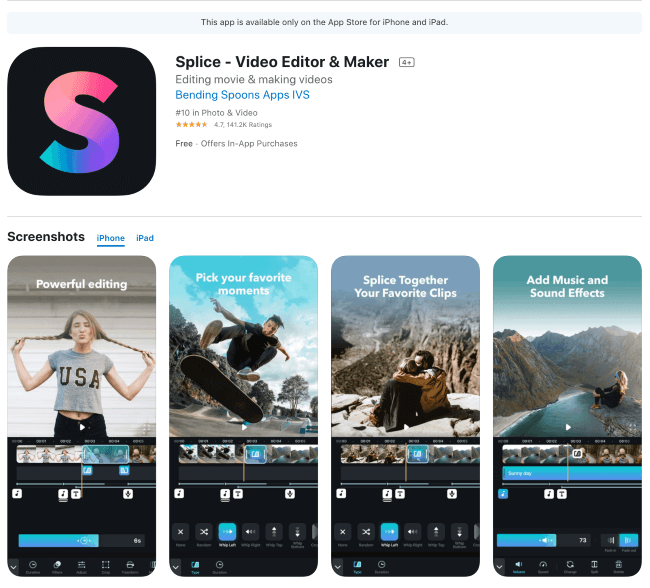
In this article
02 What Can You Do with Splice?
03 Does Splice have a desktop version?
What Exactly Is Splice?
The Splice video editor is a mobile editing tool initially developed by the GoPro Company but recently landed at the doors of Bending Spoons Company. After its update in September 2020, this app gained thousands of customer ratings, close to five-star ratings. It is a mobile video editor compatible with Android and iPhone mobile devices. The numerous effects and tools make it possible for you to create eye-catching videos for use and export.
More so, Splice contains several features that are ready to turn your video into an imaginary piece of work. The user interface is quite intuitive, and you can easily navigate even if you are a beginner. Its library is quite extensive, with tons of royalty-free music. You are also not limited to adding any of your favorite sound effects. And when it comes to uploading your video, do it directly to media sites like Facebook, YouTube, and Twitter, among other sites. The only drawback is occasional crashing, especially if handling bulky videos.
Splice App Advantages
- It is simple to use and has an intuitive user interface.
- Splice has an extensive audio library to extract your music for background listening on videos.
- Directly upload your completed video to social media sites like YouTube and Instagram.
Splice App Disadvantages
- It may crash.
- It is also under copyright.
- Spice lacks a desktop version.
You May Be Interested in
- Best Mobile Video Editing Apps for iPhone And Android
- Best GoPro Editing Apps for iPhone and Android Phone
What Can You Do with Splice?
The Splice app is at your service to explore its features and make compelling videos. Check out some of the creative things you can do with Splice.
1) Add Music
Besides adding effects, borders, sound effects, and transitions to your video, you can spice it up with some background music. You can either pick a track from a streaming service or create some voiceovers. The Splice app also provides a wide array of music from its library.
Step 1. To access music, tap on the “Audio” tab in the editor.
Step 2. Then select one of the “+” symbols to add a category. Alternatively, import music from your “iTunes” library if you operate an iOS device.
Step 3. Choose which part of the video to add your music for background listening.

2) Edit videos
You can apply simple edits like merging, adjusting speed, and trimming, among other basic editing functions.
Step 1. First, tap a video on the project screen.
Step 2. The “Plus” and “Pencil” buttons will appear shortly. Then tap on the pencil to unleash several options.
Step 3. To trim your video, adjust the starting and ending points located at the slider that is beneath the video.
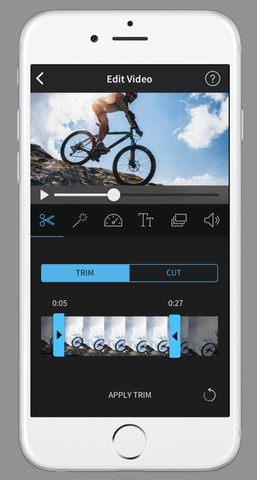
3) Add text
You can also include text in your video to explain a particular scenario.
Step 1. First, tap on the title icon at the bottom of the timeline.
Step 2. Delete the blank background to make the text a subtitle. If you don’t then Splice will treat all texts as titles.
Step 3. Lastly, double-tap the media screen and type the title of your video.
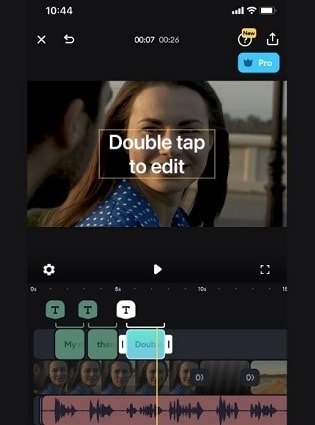
4) Add video or image overlays
You can increase your creativity level by adding image overlays.
Step 1. Ensure the video or image you wish to add to the overlay is in the timeline.
Step 2. Then press and hold on to the video or image you wish to add as an overlay.
Step 3. Drag the video or image to the “Drop here to turn it into an overlay” tab.
Step 4: Finally, trim your clip and make other necessary adjustments.
5) Apply advanced effects
It doesn’t have to be plain. Your video needs some elevating additions to it to make it stand out. With Splice, you can trim, cut, and even merge your videos. Likewise, you can add titles, adjust the speed, and even point out specific moments such as slowing down your clips. It also lets you add effects for more appealing looks.
Step 1. Click on the “Edit video” icon.
Step 2. Pick a tool depending on the effect you want to achieve, like a blur, mixing multiple audio tracks, etc.
Step 3. Click on the “Apply” tab to apply the effects to your clip.
6) Share your video on social media platforms
This feature is quite useful when it comes to showing your friends and potential customers what you are capable of composing. Here is how to share your videos on social media sites once you complete the editing process. Remember to save your project first.
Step 1: From your phone, locate the video you want to share.
Step 2. Then click on the “Share” button found at the top-right corner of the screen.
Step 3. Choose the site to upload your video. You’ll then be able to upload it directly to Facebook, Instagram, and Twitter, among many other platforms.

Does Splice have a desktop version?
Among the cons of the Splice editing app is that it lacks a desktop version. However, other editing apps can serve as a substitute for using them on your PC. The Filmora video editor is one of its kind with adequate effects and plugins. With an intuitive user interface, Filmora lets you quickly edit any video to a professional level. Use its massive resource packs to turn your video into an explicit outcome.
For Win 7 or later (64-bit)
For macOS 10.12 or later
Features of the Filmora video editor
Filmora unleashed some new features for advanced editing capabilities.
- Instant mode: Filmora 11 has encompassed an instant mode feature that’s also time-saving. With this, you can quickly edit your videos with just a few clicks.
- Speed ramping: This feature lets you quickly edit speed ramping effects on your video. Instantly increase, reduce, or go slow-motion, among other options.
- Masking: This has been improved to let you animate the mask and customize it as per your desire.
- Automontage maker: With this feature, you can now automatically create video montages with just a few clicks.
- Creative Center: You now don’t need to go round to get your tools. The Creative Center is the tool page where you can instantly get your favorite too.
- Stock Media: The improved Filmora 11 comes with an inbuilt stock media feature where you can download and use up to 100% free copyright stock footage. These include Pixabay and Giphy, among others.
Conclusion
● The Splice video editor works earnestly on your mobile phone to edit and create compelling videos. The fact that it doesn’t support a desktop version is a major drawback.
● However, the Filmora video editor comes in handy for editing videos on both Windows and Mac OS computers. Nonetheless, the latest Filmora 11 version has added advanced features that improve its instant video editing ability.
Video creation is on the increase, especially with smartphones and easy-to-reach tablets. Simply take a video to share with your loved ones. However, it would make a great difference if you edited your video and added other lovely precepts for detailed expression. Unfortunately, most people find it challenging to create quality videos on their phones.
In most cases, they’ll need to move them to their desktops for polishing and advanced editing. That’s not the case anymore, especially, with the rise of mobile editing applications like the Splice app. It lets you easily create high-quality video content with just a few clicks.

In this article
02 What Can You Do with Splice?
03 Does Splice have a desktop version?
What Exactly Is Splice?
The Splice video editor is a mobile editing tool initially developed by the GoPro Company but recently landed at the doors of Bending Spoons Company. After its update in September 2020, this app gained thousands of customer ratings, close to five-star ratings. It is a mobile video editor compatible with Android and iPhone mobile devices. The numerous effects and tools make it possible for you to create eye-catching videos for use and export.
More so, Splice contains several features that are ready to turn your video into an imaginary piece of work. The user interface is quite intuitive, and you can easily navigate even if you are a beginner. Its library is quite extensive, with tons of royalty-free music. You are also not limited to adding any of your favorite sound effects. And when it comes to uploading your video, do it directly to media sites like Facebook, YouTube, and Twitter, among other sites. The only drawback is occasional crashing, especially if handling bulky videos.
Splice App Advantages
- It is simple to use and has an intuitive user interface.
- Splice has an extensive audio library to extract your music for background listening on videos.
- Directly upload your completed video to social media sites like YouTube and Instagram.
Splice App Disadvantages
- It may crash.
- It is also under copyright.
- Spice lacks a desktop version.
You May Be Interested in
- Best Mobile Video Editing Apps for iPhone And Android
- Best GoPro Editing Apps for iPhone and Android Phone
What Can You Do with Splice?
The Splice app is at your service to explore its features and make compelling videos. Check out some of the creative things you can do with Splice.
1) Add Music
Besides adding effects, borders, sound effects, and transitions to your video, you can spice it up with some background music. You can either pick a track from a streaming service or create some voiceovers. The Splice app also provides a wide array of music from its library.
Step 1. To access music, tap on the “Audio” tab in the editor.
Step 2. Then select one of the “+” symbols to add a category. Alternatively, import music from your “iTunes” library if you operate an iOS device.
Step 3. Choose which part of the video to add your music for background listening.

2) Edit videos
You can apply simple edits like merging, adjusting speed, and trimming, among other basic editing functions.
Step 1. First, tap a video on the project screen.
Step 2. The “Plus” and “Pencil” buttons will appear shortly. Then tap on the pencil to unleash several options.
Step 3. To trim your video, adjust the starting and ending points located at the slider that is beneath the video.

3) Add text
You can also include text in your video to explain a particular scenario.
Step 1. First, tap on the title icon at the bottom of the timeline.
Step 2. Delete the blank background to make the text a subtitle. If you don’t then Splice will treat all texts as titles.
Step 3. Lastly, double-tap the media screen and type the title of your video.

4) Add video or image overlays
You can increase your creativity level by adding image overlays.
Step 1. Ensure the video or image you wish to add to the overlay is in the timeline.
Step 2. Then press and hold on to the video or image you wish to add as an overlay.
Step 3. Drag the video or image to the “Drop here to turn it into an overlay” tab.
Step 4: Finally, trim your clip and make other necessary adjustments.
5) Apply advanced effects
It doesn’t have to be plain. Your video needs some elevating additions to it to make it stand out. With Splice, you can trim, cut, and even merge your videos. Likewise, you can add titles, adjust the speed, and even point out specific moments such as slowing down your clips. It also lets you add effects for more appealing looks.
Step 1. Click on the “Edit video” icon.
Step 2. Pick a tool depending on the effect you want to achieve, like a blur, mixing multiple audio tracks, etc.
Step 3. Click on the “Apply” tab to apply the effects to your clip.
6) Share your video on social media platforms
This feature is quite useful when it comes to showing your friends and potential customers what you are capable of composing. Here is how to share your videos on social media sites once you complete the editing process. Remember to save your project first.
Step 1: From your phone, locate the video you want to share.
Step 2. Then click on the “Share” button found at the top-right corner of the screen.
Step 3. Choose the site to upload your video. You’ll then be able to upload it directly to Facebook, Instagram, and Twitter, among many other platforms.

Does Splice have a desktop version?
Among the cons of the Splice editing app is that it lacks a desktop version. However, other editing apps can serve as a substitute for using them on your PC. The Filmora video editor is one of its kind with adequate effects and plugins. With an intuitive user interface, Filmora lets you quickly edit any video to a professional level. Use its massive resource packs to turn your video into an explicit outcome.
For Win 7 or later (64-bit)
For macOS 10.12 or later
Features of the Filmora video editor
Filmora unleashed some new features for advanced editing capabilities.
- Instant mode: Filmora 11 has encompassed an instant mode feature that’s also time-saving. With this, you can quickly edit your videos with just a few clicks.
- Speed ramping: This feature lets you quickly edit speed ramping effects on your video. Instantly increase, reduce, or go slow-motion, among other options.
- Masking: This has been improved to let you animate the mask and customize it as per your desire.
- Automontage maker: With this feature, you can now automatically create video montages with just a few clicks.
- Creative Center: You now don’t need to go round to get your tools. The Creative Center is the tool page where you can instantly get your favorite too.
- Stock Media: The improved Filmora 11 comes with an inbuilt stock media feature where you can download and use up to 100% free copyright stock footage. These include Pixabay and Giphy, among others.
Conclusion
● The Splice video editor works earnestly on your mobile phone to edit and create compelling videos. The fact that it doesn’t support a desktop version is a major drawback.
● However, the Filmora video editor comes in handy for editing videos on both Windows and Mac OS computers. Nonetheless, the latest Filmora 11 version has added advanced features that improve its instant video editing ability.
Video creation is on the increase, especially with smartphones and easy-to-reach tablets. Simply take a video to share with your loved ones. However, it would make a great difference if you edited your video and added other lovely precepts for detailed expression. Unfortunately, most people find it challenging to create quality videos on their phones.
In most cases, they’ll need to move them to their desktops for polishing and advanced editing. That’s not the case anymore, especially, with the rise of mobile editing applications like the Splice app. It lets you easily create high-quality video content with just a few clicks.

In this article
02 What Can You Do with Splice?
03 Does Splice have a desktop version?
What Exactly Is Splice?
The Splice video editor is a mobile editing tool initially developed by the GoPro Company but recently landed at the doors of Bending Spoons Company. After its update in September 2020, this app gained thousands of customer ratings, close to five-star ratings. It is a mobile video editor compatible with Android and iPhone mobile devices. The numerous effects and tools make it possible for you to create eye-catching videos for use and export.
More so, Splice contains several features that are ready to turn your video into an imaginary piece of work. The user interface is quite intuitive, and you can easily navigate even if you are a beginner. Its library is quite extensive, with tons of royalty-free music. You are also not limited to adding any of your favorite sound effects. And when it comes to uploading your video, do it directly to media sites like Facebook, YouTube, and Twitter, among other sites. The only drawback is occasional crashing, especially if handling bulky videos.
Splice App Advantages
- It is simple to use and has an intuitive user interface.
- Splice has an extensive audio library to extract your music for background listening on videos.
- Directly upload your completed video to social media sites like YouTube and Instagram.
Splice App Disadvantages
- It may crash.
- It is also under copyright.
- Spice lacks a desktop version.
You May Be Interested in
- Best Mobile Video Editing Apps for iPhone And Android
- Best GoPro Editing Apps for iPhone and Android Phone
What Can You Do with Splice?
The Splice app is at your service to explore its features and make compelling videos. Check out some of the creative things you can do with Splice.
1) Add Music
Besides adding effects, borders, sound effects, and transitions to your video, you can spice it up with some background music. You can either pick a track from a streaming service or create some voiceovers. The Splice app also provides a wide array of music from its library.
Step 1. To access music, tap on the “Audio” tab in the editor.
Step 2. Then select one of the “+” symbols to add a category. Alternatively, import music from your “iTunes” library if you operate an iOS device.
Step 3. Choose which part of the video to add your music for background listening.

2) Edit videos
You can apply simple edits like merging, adjusting speed, and trimming, among other basic editing functions.
Step 1. First, tap a video on the project screen.
Step 2. The “Plus” and “Pencil” buttons will appear shortly. Then tap on the pencil to unleash several options.
Step 3. To trim your video, adjust the starting and ending points located at the slider that is beneath the video.

3) Add text
You can also include text in your video to explain a particular scenario.
Step 1. First, tap on the title icon at the bottom of the timeline.
Step 2. Delete the blank background to make the text a subtitle. If you don’t then Splice will treat all texts as titles.
Step 3. Lastly, double-tap the media screen and type the title of your video.

4) Add video or image overlays
You can increase your creativity level by adding image overlays.
Step 1. Ensure the video or image you wish to add to the overlay is in the timeline.
Step 2. Then press and hold on to the video or image you wish to add as an overlay.
Step 3. Drag the video or image to the “Drop here to turn it into an overlay” tab.
Step 4: Finally, trim your clip and make other necessary adjustments.
5) Apply advanced effects
It doesn’t have to be plain. Your video needs some elevating additions to it to make it stand out. With Splice, you can trim, cut, and even merge your videos. Likewise, you can add titles, adjust the speed, and even point out specific moments such as slowing down your clips. It also lets you add effects for more appealing looks.
Step 1. Click on the “Edit video” icon.
Step 2. Pick a tool depending on the effect you want to achieve, like a blur, mixing multiple audio tracks, etc.
Step 3. Click on the “Apply” tab to apply the effects to your clip.
6) Share your video on social media platforms
This feature is quite useful when it comes to showing your friends and potential customers what you are capable of composing. Here is how to share your videos on social media sites once you complete the editing process. Remember to save your project first.
Step 1: From your phone, locate the video you want to share.
Step 2. Then click on the “Share” button found at the top-right corner of the screen.
Step 3. Choose the site to upload your video. You’ll then be able to upload it directly to Facebook, Instagram, and Twitter, among many other platforms.

Does Splice have a desktop version?
Among the cons of the Splice editing app is that it lacks a desktop version. However, other editing apps can serve as a substitute for using them on your PC. The Filmora video editor is one of its kind with adequate effects and plugins. With an intuitive user interface, Filmora lets you quickly edit any video to a professional level. Use its massive resource packs to turn your video into an explicit outcome.
For Win 7 or later (64-bit)
For macOS 10.12 or later
Features of the Filmora video editor
Filmora unleashed some new features for advanced editing capabilities.
- Instant mode: Filmora 11 has encompassed an instant mode feature that’s also time-saving. With this, you can quickly edit your videos with just a few clicks.
- Speed ramping: This feature lets you quickly edit speed ramping effects on your video. Instantly increase, reduce, or go slow-motion, among other options.
- Masking: This has been improved to let you animate the mask and customize it as per your desire.
- Automontage maker: With this feature, you can now automatically create video montages with just a few clicks.
- Creative Center: You now don’t need to go round to get your tools. The Creative Center is the tool page where you can instantly get your favorite too.
- Stock Media: The improved Filmora 11 comes with an inbuilt stock media feature where you can download and use up to 100% free copyright stock footage. These include Pixabay and Giphy, among others.
Conclusion
● The Splice video editor works earnestly on your mobile phone to edit and create compelling videos. The fact that it doesn’t support a desktop version is a major drawback.
● However, the Filmora video editor comes in handy for editing videos on both Windows and Mac OS computers. Nonetheless, the latest Filmora 11 version has added advanced features that improve its instant video editing ability.
Video creation is on the increase, especially with smartphones and easy-to-reach tablets. Simply take a video to share with your loved ones. However, it would make a great difference if you edited your video and added other lovely precepts for detailed expression. Unfortunately, most people find it challenging to create quality videos on their phones.
In most cases, they’ll need to move them to their desktops for polishing and advanced editing. That’s not the case anymore, especially, with the rise of mobile editing applications like the Splice app. It lets you easily create high-quality video content with just a few clicks.

In this article
02 What Can You Do with Splice?
03 Does Splice have a desktop version?
What Exactly Is Splice?
The Splice video editor is a mobile editing tool initially developed by the GoPro Company but recently landed at the doors of Bending Spoons Company. After its update in September 2020, this app gained thousands of customer ratings, close to five-star ratings. It is a mobile video editor compatible with Android and iPhone mobile devices. The numerous effects and tools make it possible for you to create eye-catching videos for use and export.
More so, Splice contains several features that are ready to turn your video into an imaginary piece of work. The user interface is quite intuitive, and you can easily navigate even if you are a beginner. Its library is quite extensive, with tons of royalty-free music. You are also not limited to adding any of your favorite sound effects. And when it comes to uploading your video, do it directly to media sites like Facebook, YouTube, and Twitter, among other sites. The only drawback is occasional crashing, especially if handling bulky videos.
Splice App Advantages
- It is simple to use and has an intuitive user interface.
- Splice has an extensive audio library to extract your music for background listening on videos.
- Directly upload your completed video to social media sites like YouTube and Instagram.
Splice App Disadvantages
- It may crash.
- It is also under copyright.
- Spice lacks a desktop version.
You May Be Interested in
- Best Mobile Video Editing Apps for iPhone And Android
- Best GoPro Editing Apps for iPhone and Android Phone
What Can You Do with Splice?
The Splice app is at your service to explore its features and make compelling videos. Check out some of the creative things you can do with Splice.
1) Add Music
Besides adding effects, borders, sound effects, and transitions to your video, you can spice it up with some background music. You can either pick a track from a streaming service or create some voiceovers. The Splice app also provides a wide array of music from its library.
Step 1. To access music, tap on the “Audio” tab in the editor.
Step 2. Then select one of the “+” symbols to add a category. Alternatively, import music from your “iTunes” library if you operate an iOS device.
Step 3. Choose which part of the video to add your music for background listening.

2) Edit videos
You can apply simple edits like merging, adjusting speed, and trimming, among other basic editing functions.
Step 1. First, tap a video on the project screen.
Step 2. The “Plus” and “Pencil” buttons will appear shortly. Then tap on the pencil to unleash several options.
Step 3. To trim your video, adjust the starting and ending points located at the slider that is beneath the video.

3) Add text
You can also include text in your video to explain a particular scenario.
Step 1. First, tap on the title icon at the bottom of the timeline.
Step 2. Delete the blank background to make the text a subtitle. If you don’t then Splice will treat all texts as titles.
Step 3. Lastly, double-tap the media screen and type the title of your video.

4) Add video or image overlays
You can increase your creativity level by adding image overlays.
Step 1. Ensure the video or image you wish to add to the overlay is in the timeline.
Step 2. Then press and hold on to the video or image you wish to add as an overlay.
Step 3. Drag the video or image to the “Drop here to turn it into an overlay” tab.
Step 4: Finally, trim your clip and make other necessary adjustments.
5) Apply advanced effects
It doesn’t have to be plain. Your video needs some elevating additions to it to make it stand out. With Splice, you can trim, cut, and even merge your videos. Likewise, you can add titles, adjust the speed, and even point out specific moments such as slowing down your clips. It also lets you add effects for more appealing looks.
Step 1. Click on the “Edit video” icon.
Step 2. Pick a tool depending on the effect you want to achieve, like a blur, mixing multiple audio tracks, etc.
Step 3. Click on the “Apply” tab to apply the effects to your clip.
6) Share your video on social media platforms
This feature is quite useful when it comes to showing your friends and potential customers what you are capable of composing. Here is how to share your videos on social media sites once you complete the editing process. Remember to save your project first.
Step 1: From your phone, locate the video you want to share.
Step 2. Then click on the “Share” button found at the top-right corner of the screen.
Step 3. Choose the site to upload your video. You’ll then be able to upload it directly to Facebook, Instagram, and Twitter, among many other platforms.

Does Splice have a desktop version?
Among the cons of the Splice editing app is that it lacks a desktop version. However, other editing apps can serve as a substitute for using them on your PC. The Filmora video editor is one of its kind with adequate effects and plugins. With an intuitive user interface, Filmora lets you quickly edit any video to a professional level. Use its massive resource packs to turn your video into an explicit outcome.
For Win 7 or later (64-bit)
For macOS 10.12 or later
Features of the Filmora video editor
Filmora unleashed some new features for advanced editing capabilities.
- Instant mode: Filmora 11 has encompassed an instant mode feature that’s also time-saving. With this, you can quickly edit your videos with just a few clicks.
- Speed ramping: This feature lets you quickly edit speed ramping effects on your video. Instantly increase, reduce, or go slow-motion, among other options.
- Masking: This has been improved to let you animate the mask and customize it as per your desire.
- Automontage maker: With this feature, you can now automatically create video montages with just a few clicks.
- Creative Center: You now don’t need to go round to get your tools. The Creative Center is the tool page where you can instantly get your favorite too.
- Stock Media: The improved Filmora 11 comes with an inbuilt stock media feature where you can download and use up to 100% free copyright stock footage. These include Pixabay and Giphy, among others.
Conclusion
● The Splice video editor works earnestly on your mobile phone to edit and create compelling videos. The fact that it doesn’t support a desktop version is a major drawback.
● However, the Filmora video editor comes in handy for editing videos on both Windows and Mac OS computers. Nonetheless, the latest Filmora 11 version has added advanced features that improve its instant video editing ability.
FCPX Audio Techniques: Mastering L-Cuts, J-Cuts, and Beyond
Final Cut Pro X Tutorial: L-Cuts and J-Cuts

Benjamin Arango
Aug 18, 2022• Proven solutions
If you wish to edit or create videos like a pro, you do not need to be a professional. Instead, be creative, learn new things, and think out of the box. You could draw inspiration from videos and films for their great clips and animations. If you are already familiar with video making, you would know basic editing tasks like trim, crop, transitions, filters, and so on. Ever knew the term J-Cuts, and L-Cuts?
It could be surprising, but yes, your well-known Final Cut Pro X has this powerful feature still overlooked by many people. So, today, we take it on hand and shall share what L-Cuts and J-Cuts mean. You will be able to create it on your own by the end of this article.
Part 1: The Use of L-Cuts and J-Cuts in Video Editing
Ordinary images, text, subtitles, and GIF doesn’t work anymore to get followers or likes on a video on YouTube channel or Instagram. Thus, video creators are tired of trying the same filters, transitions on the video editor tool. To create amazing videos like the ones played on your television and favorite movies, all you need is the split edit type techniques, a powerful editing tool used by professional editors. Although called professional, it isn’t difficult for a beginner if you know J-Cuts and L-Cuts.
They are nothing but the transition between the video and audio at different times and are entirely separate from wipes and fades. Such video editing technique helps in maintaining visual continuity. These super basic cuts are a combination of dialogue and imagery, thus keeping the video flow without a monotonous feeling.
When you look at the above interface, you will see the basic phenomenon behind the two split cuts. In L-Cuts, although the first video ends, the audio continues to clip two as well.
Then, what is a J cut in Final Cut Pro? It is ultimately reverse or opposite of L-Cuts. Yes, the second clip’s audio starts a while before the scene of the first video ends.
Part 2: Step-by-step Guide on Using L-Cuts and J-Cuts in Final Cut Pro X
As Final Cut Pro X comes overloaded with advanced, powerful tools, you can find it a little tricky. Hence, we are here to help you perform the Final Cut Pro L-Cuts in this session. And, yes, the Final Cut Pro J-Cuts as well.
Step 1: Import media files
Once you launch Final Cut Pro X on your Mac device, create a new project by tapping project under the new section of the “File” menu.
You can now import the video file to the workspace by executing “File > Export > Media” or by tapping the “Import Media” option on the welcome screen.
Step 2: Expand audio in video
Now, drag the videos to the timeline in the respective order, and expand or detach the video’s audio on the timeline for easy or precise working.
Step 3: Drag the second video to the left
To create the Final Cut Pro L-Cuts, make sure that the first clip’s edit point or audio fades out at the end.
Finally, drag the second clip’s edit point to the left so that the video gets the audio of the first video.
L-Cuts are now in Final Cut Pro X.
Note: Here, the L-Cuts added video clip has no audio and has related well enough to the first video clip. If the second video has audio, it must be detached first, and then you should drag the edit point.
Step 4: Final Cut Pro J-Cuts
In the case of Final Cut Pro J-Cuts, the process is reverse, where you need to detach the audio of the preceding or following video clip and drag the first video to the right.
When you look at the transition closely, you can see that it resembles the letter J.
Part 3: Final Cut Pro X Keyboard Shortcuts for L-Cuts and J-Cuts
Final Cut Pro X offers specific keyword shorts to perform Final Cut Pro L-Cuts and Final Cut Pro J-Cuts.
1. As the first step, trim the clips shorter to get the media handles. To detach audio from the video clip, you need to press “Ctrl + S” which will expand the audio.
2. Now, move or place the playhead at the endpoint of both the video clips where here are the keyboard shortcuts:
- To shift the playhead to the earlier edit point: press “Semicolon (;) or up arrow key”.
- To move the playhead to the next edit point: press “Apostrophe (‘) or down arrow key”.
3. To choose the audio or the video edit point, you can do one of the following:
- Press “**Shift-Backslash (\)**” to select both sides of the audio endpoint.
- Press “**Backslash (\)**” to pick both sides of the video endpoint.
4. Here is the actual process or the keyboard shortcut that helps accomplish final cut pro-L-cuts or final cut pro-J-cuts by nudging the edit points.
- To nudge or push the edit point to the left or right: press “**Comma (,) or period (.)**”.
- To move the edit point to the left or right with ten frames: press “**Shift-Comma (,) or Sift-Period (.)**”.
- Using timecode to add or subtract the present edit: press the “**Plus (+)” or “Minus (-)**” key with the timecode duration.
Conclusion
Are you wondering and puzzled that you are a popular Final Cut Pro X user but weren’t aware of this powerful split edit tool till now? It isn’t too late for you to start yet. Finally, as assured at the beginning of the article, we gave you detailed information on what are J-Cuts in Final Cut Pro along with L-Cuts. With practical implementation on creating Final Cut Pro L-Cuts and J-Cuts, all the best for your first video project!

Benjamin Arango
Benjamin Arango is a writer and a lover of all things video.
Follow @Benjamin Arango
Benjamin Arango
Aug 18, 2022• Proven solutions
If you wish to edit or create videos like a pro, you do not need to be a professional. Instead, be creative, learn new things, and think out of the box. You could draw inspiration from videos and films for their great clips and animations. If you are already familiar with video making, you would know basic editing tasks like trim, crop, transitions, filters, and so on. Ever knew the term J-Cuts, and L-Cuts?
It could be surprising, but yes, your well-known Final Cut Pro X has this powerful feature still overlooked by many people. So, today, we take it on hand and shall share what L-Cuts and J-Cuts mean. You will be able to create it on your own by the end of this article.
Part 1: The Use of L-Cuts and J-Cuts in Video Editing
Ordinary images, text, subtitles, and GIF doesn’t work anymore to get followers or likes on a video on YouTube channel or Instagram. Thus, video creators are tired of trying the same filters, transitions on the video editor tool. To create amazing videos like the ones played on your television and favorite movies, all you need is the split edit type techniques, a powerful editing tool used by professional editors. Although called professional, it isn’t difficult for a beginner if you know J-Cuts and L-Cuts.
They are nothing but the transition between the video and audio at different times and are entirely separate from wipes and fades. Such video editing technique helps in maintaining visual continuity. These super basic cuts are a combination of dialogue and imagery, thus keeping the video flow without a monotonous feeling.
When you look at the above interface, you will see the basic phenomenon behind the two split cuts. In L-Cuts, although the first video ends, the audio continues to clip two as well.
Then, what is a J cut in Final Cut Pro? It is ultimately reverse or opposite of L-Cuts. Yes, the second clip’s audio starts a while before the scene of the first video ends.
Part 2: Step-by-step Guide on Using L-Cuts and J-Cuts in Final Cut Pro X
As Final Cut Pro X comes overloaded with advanced, powerful tools, you can find it a little tricky. Hence, we are here to help you perform the Final Cut Pro L-Cuts in this session. And, yes, the Final Cut Pro J-Cuts as well.
Step 1: Import media files
Once you launch Final Cut Pro X on your Mac device, create a new project by tapping project under the new section of the “File” menu.
You can now import the video file to the workspace by executing “File > Export > Media” or by tapping the “Import Media” option on the welcome screen.
Step 2: Expand audio in video
Now, drag the videos to the timeline in the respective order, and expand or detach the video’s audio on the timeline for easy or precise working.
Step 3: Drag the second video to the left
To create the Final Cut Pro L-Cuts, make sure that the first clip’s edit point or audio fades out at the end.
Finally, drag the second clip’s edit point to the left so that the video gets the audio of the first video.
L-Cuts are now in Final Cut Pro X.
Note: Here, the L-Cuts added video clip has no audio and has related well enough to the first video clip. If the second video has audio, it must be detached first, and then you should drag the edit point.
Step 4: Final Cut Pro J-Cuts
In the case of Final Cut Pro J-Cuts, the process is reverse, where you need to detach the audio of the preceding or following video clip and drag the first video to the right.
When you look at the transition closely, you can see that it resembles the letter J.
Part 3: Final Cut Pro X Keyboard Shortcuts for L-Cuts and J-Cuts
Final Cut Pro X offers specific keyword shorts to perform Final Cut Pro L-Cuts and Final Cut Pro J-Cuts.
1. As the first step, trim the clips shorter to get the media handles. To detach audio from the video clip, you need to press “Ctrl + S” which will expand the audio.
2. Now, move or place the playhead at the endpoint of both the video clips where here are the keyboard shortcuts:
- To shift the playhead to the earlier edit point: press “Semicolon (;) or up arrow key”.
- To move the playhead to the next edit point: press “Apostrophe (‘) or down arrow key”.
3. To choose the audio or the video edit point, you can do one of the following:
- Press “**Shift-Backslash (\)**” to select both sides of the audio endpoint.
- Press “**Backslash (\)**” to pick both sides of the video endpoint.
4. Here is the actual process or the keyboard shortcut that helps accomplish final cut pro-L-cuts or final cut pro-J-cuts by nudging the edit points.
- To nudge or push the edit point to the left or right: press “**Comma (,) or period (.)**”.
- To move the edit point to the left or right with ten frames: press “**Shift-Comma (,) or Sift-Period (.)**”.
- Using timecode to add or subtract the present edit: press the “**Plus (+)” or “Minus (-)**” key with the timecode duration.
Conclusion
Are you wondering and puzzled that you are a popular Final Cut Pro X user but weren’t aware of this powerful split edit tool till now? It isn’t too late for you to start yet. Finally, as assured at the beginning of the article, we gave you detailed information on what are J-Cuts in Final Cut Pro along with L-Cuts. With practical implementation on creating Final Cut Pro L-Cuts and J-Cuts, all the best for your first video project!

Benjamin Arango
Benjamin Arango is a writer and a lover of all things video.
Follow @Benjamin Arango
Benjamin Arango
Aug 18, 2022• Proven solutions
If you wish to edit or create videos like a pro, you do not need to be a professional. Instead, be creative, learn new things, and think out of the box. You could draw inspiration from videos and films for their great clips and animations. If you are already familiar with video making, you would know basic editing tasks like trim, crop, transitions, filters, and so on. Ever knew the term J-Cuts, and L-Cuts?
It could be surprising, but yes, your well-known Final Cut Pro X has this powerful feature still overlooked by many people. So, today, we take it on hand and shall share what L-Cuts and J-Cuts mean. You will be able to create it on your own by the end of this article.
Part 1: The Use of L-Cuts and J-Cuts in Video Editing
Ordinary images, text, subtitles, and GIF doesn’t work anymore to get followers or likes on a video on YouTube channel or Instagram. Thus, video creators are tired of trying the same filters, transitions on the video editor tool. To create amazing videos like the ones played on your television and favorite movies, all you need is the split edit type techniques, a powerful editing tool used by professional editors. Although called professional, it isn’t difficult for a beginner if you know J-Cuts and L-Cuts.
They are nothing but the transition between the video and audio at different times and are entirely separate from wipes and fades. Such video editing technique helps in maintaining visual continuity. These super basic cuts are a combination of dialogue and imagery, thus keeping the video flow without a monotonous feeling.
When you look at the above interface, you will see the basic phenomenon behind the two split cuts. In L-Cuts, although the first video ends, the audio continues to clip two as well.
Then, what is a J cut in Final Cut Pro? It is ultimately reverse or opposite of L-Cuts. Yes, the second clip’s audio starts a while before the scene of the first video ends.
Part 2: Step-by-step Guide on Using L-Cuts and J-Cuts in Final Cut Pro X
As Final Cut Pro X comes overloaded with advanced, powerful tools, you can find it a little tricky. Hence, we are here to help you perform the Final Cut Pro L-Cuts in this session. And, yes, the Final Cut Pro J-Cuts as well.
Step 1: Import media files
Once you launch Final Cut Pro X on your Mac device, create a new project by tapping project under the new section of the “File” menu.
You can now import the video file to the workspace by executing “File > Export > Media” or by tapping the “Import Media” option on the welcome screen.
Step 2: Expand audio in video
Now, drag the videos to the timeline in the respective order, and expand or detach the video’s audio on the timeline for easy or precise working.
Step 3: Drag the second video to the left
To create the Final Cut Pro L-Cuts, make sure that the first clip’s edit point or audio fades out at the end.
Finally, drag the second clip’s edit point to the left so that the video gets the audio of the first video.
L-Cuts are now in Final Cut Pro X.
Note: Here, the L-Cuts added video clip has no audio and has related well enough to the first video clip. If the second video has audio, it must be detached first, and then you should drag the edit point.
Step 4: Final Cut Pro J-Cuts
In the case of Final Cut Pro J-Cuts, the process is reverse, where you need to detach the audio of the preceding or following video clip and drag the first video to the right.
When you look at the transition closely, you can see that it resembles the letter J.
Part 3: Final Cut Pro X Keyboard Shortcuts for L-Cuts and J-Cuts
Final Cut Pro X offers specific keyword shorts to perform Final Cut Pro L-Cuts and Final Cut Pro J-Cuts.
1. As the first step, trim the clips shorter to get the media handles. To detach audio from the video clip, you need to press “Ctrl + S” which will expand the audio.
2. Now, move or place the playhead at the endpoint of both the video clips where here are the keyboard shortcuts:
- To shift the playhead to the earlier edit point: press “Semicolon (;) or up arrow key”.
- To move the playhead to the next edit point: press “Apostrophe (‘) or down arrow key”.
3. To choose the audio or the video edit point, you can do one of the following:
- Press “**Shift-Backslash (\)**” to select both sides of the audio endpoint.
- Press “**Backslash (\)**” to pick both sides of the video endpoint.
4. Here is the actual process or the keyboard shortcut that helps accomplish final cut pro-L-cuts or final cut pro-J-cuts by nudging the edit points.
- To nudge or push the edit point to the left or right: press “**Comma (,) or period (.)**”.
- To move the edit point to the left or right with ten frames: press “**Shift-Comma (,) or Sift-Period (.)**”.
- Using timecode to add or subtract the present edit: press the “**Plus (+)” or “Minus (-)**” key with the timecode duration.
Conclusion
Are you wondering and puzzled that you are a popular Final Cut Pro X user but weren’t aware of this powerful split edit tool till now? It isn’t too late for you to start yet. Finally, as assured at the beginning of the article, we gave you detailed information on what are J-Cuts in Final Cut Pro along with L-Cuts. With practical implementation on creating Final Cut Pro L-Cuts and J-Cuts, all the best for your first video project!

Benjamin Arango
Benjamin Arango is a writer and a lover of all things video.
Follow @Benjamin Arango
Benjamin Arango
Aug 18, 2022• Proven solutions
If you wish to edit or create videos like a pro, you do not need to be a professional. Instead, be creative, learn new things, and think out of the box. You could draw inspiration from videos and films for their great clips and animations. If you are already familiar with video making, you would know basic editing tasks like trim, crop, transitions, filters, and so on. Ever knew the term J-Cuts, and L-Cuts?
It could be surprising, but yes, your well-known Final Cut Pro X has this powerful feature still overlooked by many people. So, today, we take it on hand and shall share what L-Cuts and J-Cuts mean. You will be able to create it on your own by the end of this article.
Part 1: The Use of L-Cuts and J-Cuts in Video Editing
Ordinary images, text, subtitles, and GIF doesn’t work anymore to get followers or likes on a video on YouTube channel or Instagram. Thus, video creators are tired of trying the same filters, transitions on the video editor tool. To create amazing videos like the ones played on your television and favorite movies, all you need is the split edit type techniques, a powerful editing tool used by professional editors. Although called professional, it isn’t difficult for a beginner if you know J-Cuts and L-Cuts.
They are nothing but the transition between the video and audio at different times and are entirely separate from wipes and fades. Such video editing technique helps in maintaining visual continuity. These super basic cuts are a combination of dialogue and imagery, thus keeping the video flow without a monotonous feeling.
When you look at the above interface, you will see the basic phenomenon behind the two split cuts. In L-Cuts, although the first video ends, the audio continues to clip two as well.
Then, what is a J cut in Final Cut Pro? It is ultimately reverse or opposite of L-Cuts. Yes, the second clip’s audio starts a while before the scene of the first video ends.
Part 2: Step-by-step Guide on Using L-Cuts and J-Cuts in Final Cut Pro X
As Final Cut Pro X comes overloaded with advanced, powerful tools, you can find it a little tricky. Hence, we are here to help you perform the Final Cut Pro L-Cuts in this session. And, yes, the Final Cut Pro J-Cuts as well.
Step 1: Import media files
Once you launch Final Cut Pro X on your Mac device, create a new project by tapping project under the new section of the “File” menu.
You can now import the video file to the workspace by executing “File > Export > Media” or by tapping the “Import Media” option on the welcome screen.
Step 2: Expand audio in video
Now, drag the videos to the timeline in the respective order, and expand or detach the video’s audio on the timeline for easy or precise working.
Step 3: Drag the second video to the left
To create the Final Cut Pro L-Cuts, make sure that the first clip’s edit point or audio fades out at the end.
Finally, drag the second clip’s edit point to the left so that the video gets the audio of the first video.
L-Cuts are now in Final Cut Pro X.
Note: Here, the L-Cuts added video clip has no audio and has related well enough to the first video clip. If the second video has audio, it must be detached first, and then you should drag the edit point.
Step 4: Final Cut Pro J-Cuts
In the case of Final Cut Pro J-Cuts, the process is reverse, where you need to detach the audio of the preceding or following video clip and drag the first video to the right.
When you look at the transition closely, you can see that it resembles the letter J.
Part 3: Final Cut Pro X Keyboard Shortcuts for L-Cuts and J-Cuts
Final Cut Pro X offers specific keyword shorts to perform Final Cut Pro L-Cuts and Final Cut Pro J-Cuts.
1. As the first step, trim the clips shorter to get the media handles. To detach audio from the video clip, you need to press “Ctrl + S” which will expand the audio.
2. Now, move or place the playhead at the endpoint of both the video clips where here are the keyboard shortcuts:
- To shift the playhead to the earlier edit point: press “Semicolon (;) or up arrow key”.
- To move the playhead to the next edit point: press “Apostrophe (‘) or down arrow key”.
3. To choose the audio or the video edit point, you can do one of the following:
- Press “**Shift-Backslash (\)**” to select both sides of the audio endpoint.
- Press “**Backslash (\)**” to pick both sides of the video endpoint.
4. Here is the actual process or the keyboard shortcut that helps accomplish final cut pro-L-cuts or final cut pro-J-cuts by nudging the edit points.
- To nudge or push the edit point to the left or right: press “**Comma (,) or period (.)**”.
- To move the edit point to the left or right with ten frames: press “**Shift-Comma (,) or Sift-Period (.)**”.
- Using timecode to add or subtract the present edit: press the “**Plus (+)” or “Minus (-)**” key with the timecode duration.
Conclusion
Are you wondering and puzzled that you are a popular Final Cut Pro X user but weren’t aware of this powerful split edit tool till now? It isn’t too late for you to start yet. Finally, as assured at the beginning of the article, we gave you detailed information on what are J-Cuts in Final Cut Pro along with L-Cuts. With practical implementation on creating Final Cut Pro L-Cuts and J-Cuts, all the best for your first video project!

Benjamin Arango
Benjamin Arango is a writer and a lover of all things video.
Follow @Benjamin Arango
The Art of Text-to-Speech Conversion: Insider Secrets and Best Practices
Super Tips on Converting Text to MP3
An easy yet powerful editor
Numerous effects to choose from
Detailed tutorials provided by the official channel
Text-to-Speech is an ingenious accessibility invention that has only grown more and more popular as AI has been thrown in the mix — making the converted speech sound more natural than ever!
As requested, in this article, we’ll be focusing on the subject of converting text to MP3 format (or, rather, a tangible file that you can use for projects!)
In this article
01 [What is TTS?](#Part 1)
02 [How to Turn on Text to Speech Converter?](#Part 2)
03 [Useful Tips on Converting Text to MP3](#Part 3)
Part 1 What is TTS?
What is Text-to-Speech? Text-to-Speech, also called TTS, as previously mentioned, is an accessibility invention. It was developed to help those with vision impairment or blindness — giving them the ability to have text read to them out loud to them (without requiring someone specifically read it out loud for them.
More recent development in TTS technology has allowed it to grow more useful outside of those parameters, however. Especially seeing as it is now possible to convert text to MP3 with natural voices.
01Why Use Text to Speech Converter?
Text-to-Speech human voice converters are popular with content creators, and thus, they are the ones who see the most use for them (in the commercial sense). After all, it’s easy enough to convert already created content (in the form of text) into an audio file that there’s no reason not to! Especially since it means that more people would have access to their content!
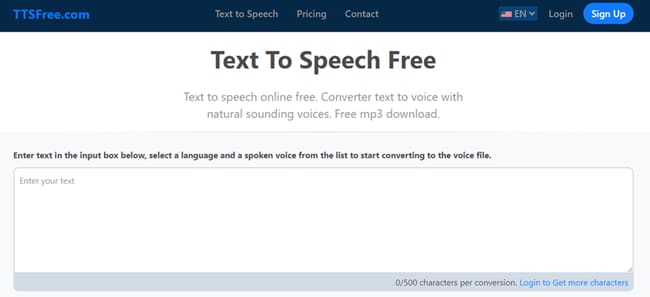
02Benefits of Free Online Text to Speech Readers
The benefit of FREE online text-to-speech human voice converters is exactly because they are free. Getting a live voice actor to convert text to MP3 for you is very expensive — since you’re paying not only for the voice-actors hours spent but also the use of the expensive equipment that they use for creating voiceovers.
In that regard, even PAID text-to-speech converters are easier on the budget. Making it the perfect solution for content creators who want to increase the accessibility of their content but do not have the time (to create the voiceovers themselves) or the money (to hire someone else to record it).
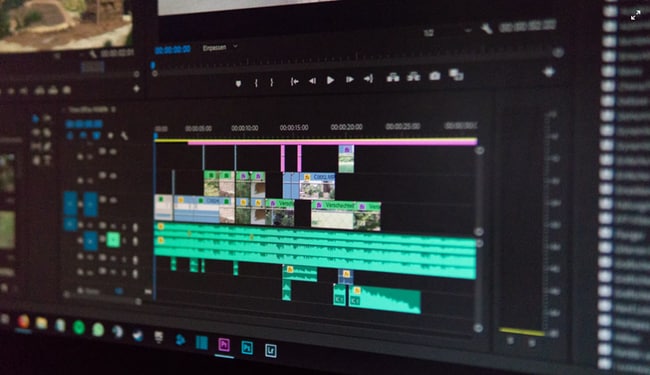
03Features of Text to Mp3 Converter
There are lots of text-to-speech converters out there. And, depending on what you’re looking for, you might find yourself longing for extra features later on down the line. That is why, when looking to convert text to MP3 we recommend considering the following:
● Converting Time: How fast does the converter work? Most text-to-speech converters work almost instantaneously! So, if the one you’re using currently is slow? It might be best to give it a pass over to the next candidate.
● Sound Quality: You should also test out whether or not the sound quality of the converted text to speech is good.
● Multi-Language Support: Since this is all for the sake of increasing accessibility, you should start thinking about how many languages your converter supports as well. You might not be able to use all of them or even want to. But, that extra function can be helpful for the future.
● Voice-Control Options: Does the converter offers you advanced voice controls? Your average converter usually offers speed and voice options, but you might find that a text-to-speech converter with more advanced options (i.e., tone, pitch, etc. controls) may help you get better quality content in the long run.
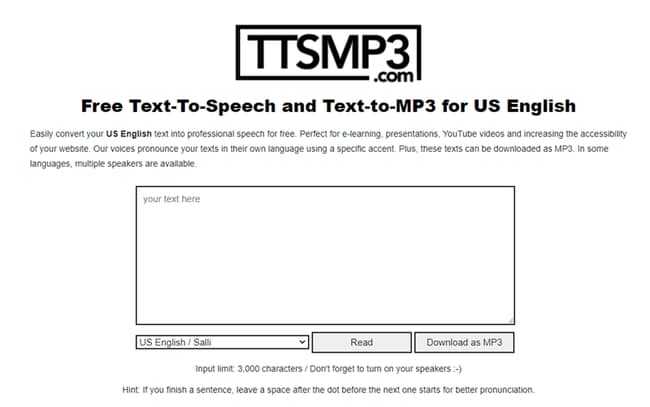
Part 2 How to Turn on Text to Speech Converter?
For the next part of this article, we’ll be teaching you how to actually get from text to speech (MP3) with the use of a TTS converter. Specifically, a FREEmium text-to-speech converter that you can use when you’re still on the trying-out stage! This part will include a tutorial and a short introduction:
014 Steps to Use and Convert Text to Speech Online Free Unlimited?
First, for the promised tutorial! Most text-to-human voice converters function much the same way. The main difference usually being on the number of features focused and the limitations imposed (for tools with FREEmium services that impose limits on the FREE version, like the tool we’ll be using for our example):
Step 1: Upload Text
First, upload the text that you want to convert into speech!
Most online converters offer a text box that you can use in order to copy & paste the text onto (like in the image below), while others offer an ‘upload’ feature that you can use to upload text from a document.
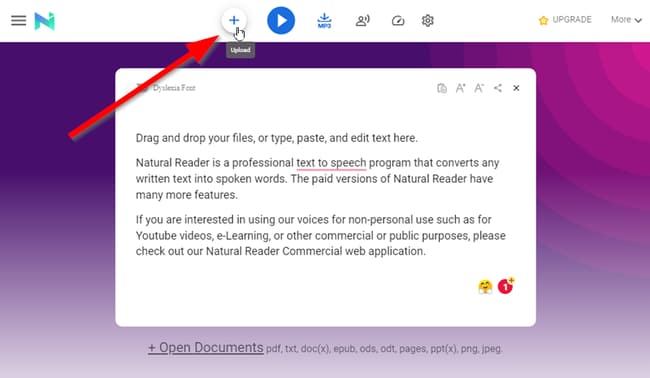
Step 2: Adjust Voice Reader!
Next, the main thing that you usually have to worry about is the voice options.
Most TTS converters at least offer the opportunity to choose what voice you want the text to be read in. Some, more advanced solutions, may offer voices in other languages, dialects, accents, etc. as well as voice control options (tone, pitch, etc.)
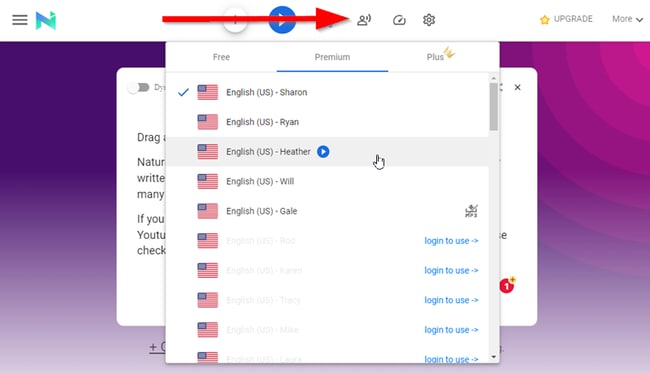
Step 3: Reader Controls!
Outside of voice options, most text-to-speech converters also offer the ability to control the general outcome of the converted text to speech.
More advanced tools will have multiple options on offer for this, but even the most basic ones at least offer a method for controlling the speed at which the text is read by the voice you’ve chosen!

Step 4: Convert Text to MP3!
Now is finally the time to convert text to MP3 format! Some TTS readers will not allow for this without you paying the premium price, but most will at least offer a limited MP3 conversion feature (usually one that limits the length of conversion or the quality).
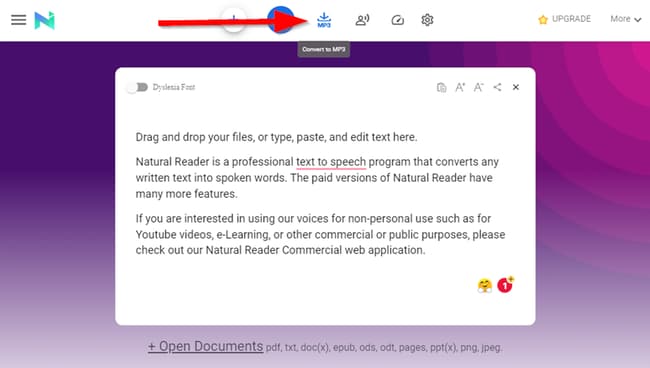
02What is the Best Free Text to Speech Software?
To finish off this section, we introduce the tool we used for our examples! It’s the online text to human voice converter, NaturalReader (URL has been provided below!) You can use this tool either directly or on your desktop (a software version is available.) It is FREEmium software though. That means that, if you want to make use of all of its advanced features, you’ll need to pay a price!

Part 3 Useful Tips on Converting Text to MP3
The tutorial in the previous section was really more for the sake of ensuring that you have the basics down and that you are familiar with how these text-to-speech converters usually work. In this next part, we’ll be focusing on “super tips”
OR, tips that allow you to generally make the most of these text-to-human voice converters to the fullest!
Tip 1: Use AI Text-to-Speech!
Our first tip is to encourage you to take full advantage of AI text-to-speech functions. Artificial Intelligence allows the converted text to sound much nicer and much more like it was read by an actual human being — which enables you to create a very professional-sounding project without having to hire a voiceover actor/actress.
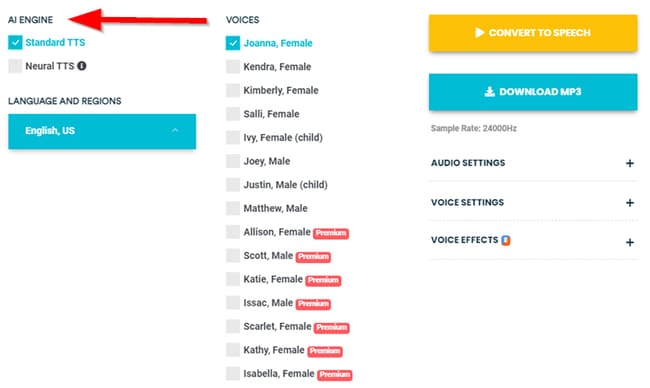
Tip 2: Language and Regions Settings!
If your content is available in multiple languages and you want to convert all of the different editions of said content, you’ll need to find a converter that supports all of those languages. You may also consider looking for regional support as well. For example, for basic English language, most TTS converters usually have “American” voices as well as “British” voices to support different accents despite them using the same text.
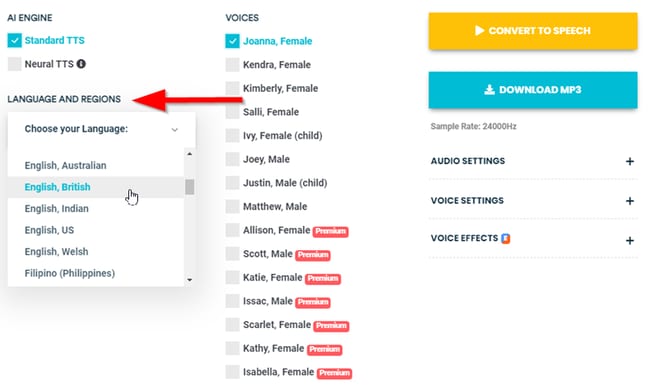
Tip 3: Pick an Appropriate Voice!
The voice you choose to read your text is also very important. Some premium text-to-human voice converters offer a great variety to choose from to give you options when it comes to what kind of voice you want to read your content.
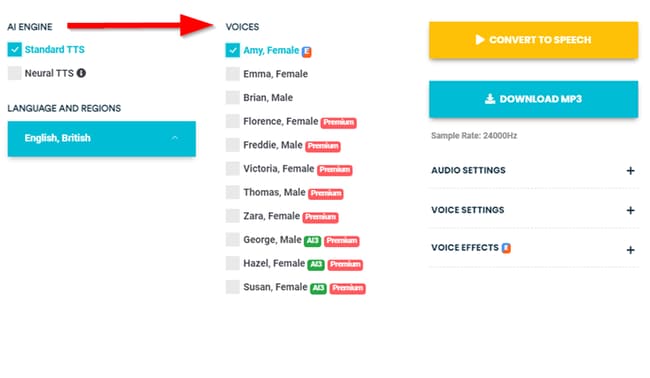
Tip 4: Audio Settings!
This is a bit of a rare feature, but some TTS converters will allow you to adjust your audio before it converts your content from text to speech (MP3). Sometimes, this is as simple as allowing you to choose an audio format (as is shown in the image below), other times, it allows you to control the actual sound quality of the finished product.
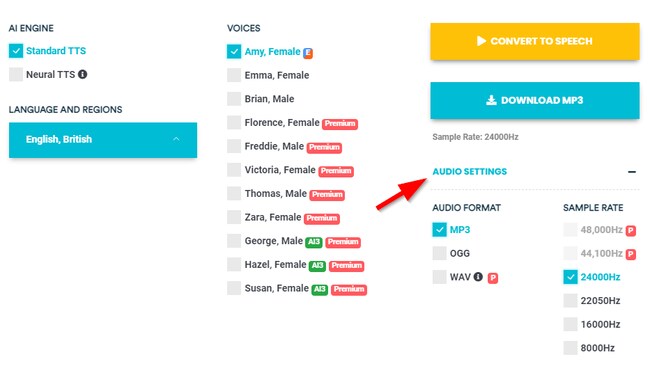
Tip 5: Adjust Voice Speed!
Earlier, we emphasized the importance of choosing your voice reader carefully! Now, we focus on the subject of speed. Some voices are better when they are slowed down, others are better when sped up. Play around with these settings to see which way is more natural for your chosen voice!
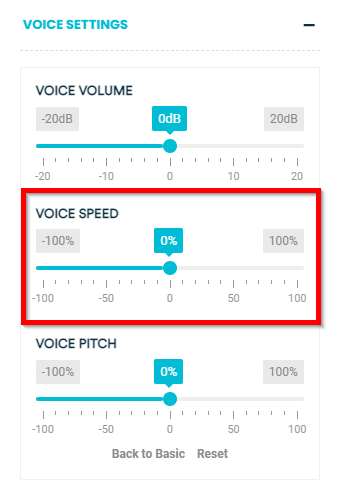
Tip 6: Adjust Voice Pitch
To allow for even more flexibility when it comes to voice style, you’ll find that some TTS converters will allow you to adjust voice pitch! This is a helpful feature for when you’re looking for that particular voice type, as it will allow you to experiment more with the kind of sound you want your content to be known for.
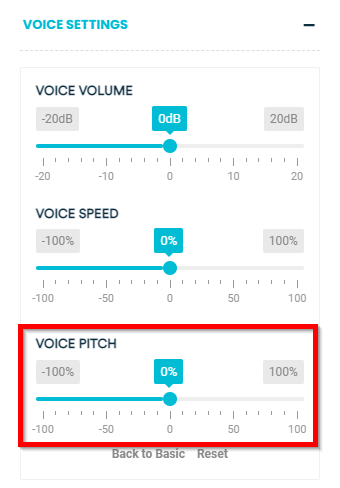
Tip 7: Voice Effects Options!
Another advanced feature that you might run into (and should definitely take advantage of), is voice effects! This, again, will allow you to fully customize the type of voice that your content is known for. It’s also great for when you’re aiming for a more natural sound (if you’re patient enough in order to take full advantage of it!)
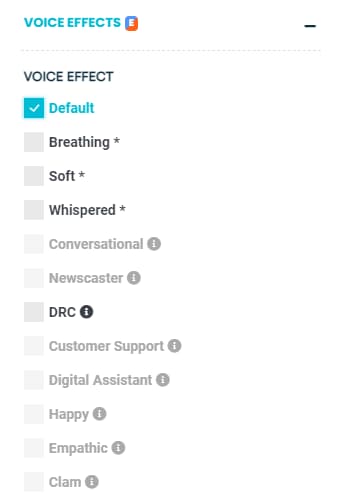
Tip 8: Use Advanced Video Editing!
Our last tip is not on the subject of using a TTS converter itself, but on the tool, you use in order to create your final project! For that, we recommend Wondershare Filmora Video Editor .
Filmora is a content creation tool that will allow you to expand your video editing capabilities with little to no effort. It’s highly intuitive and thus incredibly very easy to use — allowing you to create and perfect your content efficiently! It’s also, in this case, very good at ensuring that you can make full use of your carefully curated TTS MP3!

Wondershare Filmora - Best Video Editor for Mac/Windows
5,481,435 people have downloaded it.
Build unique custom animations without breaking a sweat.
Focus on creating epic stories and leave the details to Filmora’s auto features.
Start a creative adventure with drag & drop effects and endless possibilities.
Filmora simplifies advanced features to save you time and effort.
Filmora cuts out repetition so you can move on to your next creative breakthrough.

Key Takeaways from This Episode
● Text-to-Speech has only continued to grow popular with content creators as the technology of it improves — allowing for more natural sounding voices and endless customizations.
● Most of these text-to-speech converters work in much the same way. All you need to do is upload the text you want to convert, adjust the voice and sound settings as needed, and you’re done!
● Of course, there are some extra little tidbits that you might also want to know in order to enhance your converted text. Our general advice for that is to experiment to the fullest and make sure that you finish everything up with a high-quality video editor like Filmora to ensure that your finished project is as near to perfect as possible!
Text-to-Speech is an ingenious accessibility invention that has only grown more and more popular as AI has been thrown in the mix — making the converted speech sound more natural than ever!
As requested, in this article, we’ll be focusing on the subject of converting text to MP3 format (or, rather, a tangible file that you can use for projects!)
In this article
01 [What is TTS?](#Part 1)
02 [How to Turn on Text to Speech Converter?](#Part 2)
03 [Useful Tips on Converting Text to MP3](#Part 3)
Part 1 What is TTS?
What is Text-to-Speech? Text-to-Speech, also called TTS, as previously mentioned, is an accessibility invention. It was developed to help those with vision impairment or blindness — giving them the ability to have text read to them out loud to them (without requiring someone specifically read it out loud for them.
More recent development in TTS technology has allowed it to grow more useful outside of those parameters, however. Especially seeing as it is now possible to convert text to MP3 with natural voices.
01Why Use Text to Speech Converter?
Text-to-Speech human voice converters are popular with content creators, and thus, they are the ones who see the most use for them (in the commercial sense). After all, it’s easy enough to convert already created content (in the form of text) into an audio file that there’s no reason not to! Especially since it means that more people would have access to their content!

02Benefits of Free Online Text to Speech Readers
The benefit of FREE online text-to-speech human voice converters is exactly because they are free. Getting a live voice actor to convert text to MP3 for you is very expensive — since you’re paying not only for the voice-actors hours spent but also the use of the expensive equipment that they use for creating voiceovers.
In that regard, even PAID text-to-speech converters are easier on the budget. Making it the perfect solution for content creators who want to increase the accessibility of their content but do not have the time (to create the voiceovers themselves) or the money (to hire someone else to record it).

03Features of Text to Mp3 Converter
There are lots of text-to-speech converters out there. And, depending on what you’re looking for, you might find yourself longing for extra features later on down the line. That is why, when looking to convert text to MP3 we recommend considering the following:
● Converting Time: How fast does the converter work? Most text-to-speech converters work almost instantaneously! So, if the one you’re using currently is slow? It might be best to give it a pass over to the next candidate.
● Sound Quality: You should also test out whether or not the sound quality of the converted text to speech is good.
● Multi-Language Support: Since this is all for the sake of increasing accessibility, you should start thinking about how many languages your converter supports as well. You might not be able to use all of them or even want to. But, that extra function can be helpful for the future.
● Voice-Control Options: Does the converter offers you advanced voice controls? Your average converter usually offers speed and voice options, but you might find that a text-to-speech converter with more advanced options (i.e., tone, pitch, etc. controls) may help you get better quality content in the long run.

Part 2 How to Turn on Text to Speech Converter?
For the next part of this article, we’ll be teaching you how to actually get from text to speech (MP3) with the use of a TTS converter. Specifically, a FREEmium text-to-speech converter that you can use when you’re still on the trying-out stage! This part will include a tutorial and a short introduction:
014 Steps to Use and Convert Text to Speech Online Free Unlimited?
First, for the promised tutorial! Most text-to-human voice converters function much the same way. The main difference usually being on the number of features focused and the limitations imposed (for tools with FREEmium services that impose limits on the FREE version, like the tool we’ll be using for our example):
Step 1: Upload Text
First, upload the text that you want to convert into speech!
Most online converters offer a text box that you can use in order to copy & paste the text onto (like in the image below), while others offer an ‘upload’ feature that you can use to upload text from a document.

Step 2: Adjust Voice Reader!
Next, the main thing that you usually have to worry about is the voice options.
Most TTS converters at least offer the opportunity to choose what voice you want the text to be read in. Some, more advanced solutions, may offer voices in other languages, dialects, accents, etc. as well as voice control options (tone, pitch, etc.)

Step 3: Reader Controls!
Outside of voice options, most text-to-speech converters also offer the ability to control the general outcome of the converted text to speech.
More advanced tools will have multiple options on offer for this, but even the most basic ones at least offer a method for controlling the speed at which the text is read by the voice you’ve chosen!

Step 4: Convert Text to MP3!
Now is finally the time to convert text to MP3 format! Some TTS readers will not allow for this without you paying the premium price, but most will at least offer a limited MP3 conversion feature (usually one that limits the length of conversion or the quality).

02What is the Best Free Text to Speech Software?
To finish off this section, we introduce the tool we used for our examples! It’s the online text to human voice converter, NaturalReader (URL has been provided below!) You can use this tool either directly or on your desktop (a software version is available.) It is FREEmium software though. That means that, if you want to make use of all of its advanced features, you’ll need to pay a price!

Part 3 Useful Tips on Converting Text to MP3
The tutorial in the previous section was really more for the sake of ensuring that you have the basics down and that you are familiar with how these text-to-speech converters usually work. In this next part, we’ll be focusing on “super tips”
OR, tips that allow you to generally make the most of these text-to-human voice converters to the fullest!
Tip 1: Use AI Text-to-Speech!
Our first tip is to encourage you to take full advantage of AI text-to-speech functions. Artificial Intelligence allows the converted text to sound much nicer and much more like it was read by an actual human being — which enables you to create a very professional-sounding project without having to hire a voiceover actor/actress.

Tip 2: Language and Regions Settings!
If your content is available in multiple languages and you want to convert all of the different editions of said content, you’ll need to find a converter that supports all of those languages. You may also consider looking for regional support as well. For example, for basic English language, most TTS converters usually have “American” voices as well as “British” voices to support different accents despite them using the same text.

Tip 3: Pick an Appropriate Voice!
The voice you choose to read your text is also very important. Some premium text-to-human voice converters offer a great variety to choose from to give you options when it comes to what kind of voice you want to read your content.

Tip 4: Audio Settings!
This is a bit of a rare feature, but some TTS converters will allow you to adjust your audio before it converts your content from text to speech (MP3). Sometimes, this is as simple as allowing you to choose an audio format (as is shown in the image below), other times, it allows you to control the actual sound quality of the finished product.

Tip 5: Adjust Voice Speed!
Earlier, we emphasized the importance of choosing your voice reader carefully! Now, we focus on the subject of speed. Some voices are better when they are slowed down, others are better when sped up. Play around with these settings to see which way is more natural for your chosen voice!

Tip 6: Adjust Voice Pitch
To allow for even more flexibility when it comes to voice style, you’ll find that some TTS converters will allow you to adjust voice pitch! This is a helpful feature for when you’re looking for that particular voice type, as it will allow you to experiment more with the kind of sound you want your content to be known for.

Tip 7: Voice Effects Options!
Another advanced feature that you might run into (and should definitely take advantage of), is voice effects! This, again, will allow you to fully customize the type of voice that your content is known for. It’s also great for when you’re aiming for a more natural sound (if you’re patient enough in order to take full advantage of it!)

Tip 8: Use Advanced Video Editing!
Our last tip is not on the subject of using a TTS converter itself, but on the tool, you use in order to create your final project! For that, we recommend Wondershare Filmora Video Editor .
Filmora is a content creation tool that will allow you to expand your video editing capabilities with little to no effort. It’s highly intuitive and thus incredibly very easy to use — allowing you to create and perfect your content efficiently! It’s also, in this case, very good at ensuring that you can make full use of your carefully curated TTS MP3!

Wondershare Filmora - Best Video Editor for Mac/Windows
5,481,435 people have downloaded it.
Build unique custom animations without breaking a sweat.
Focus on creating epic stories and leave the details to Filmora’s auto features.
Start a creative adventure with drag & drop effects and endless possibilities.
Filmora simplifies advanced features to save you time and effort.
Filmora cuts out repetition so you can move on to your next creative breakthrough.

Key Takeaways from This Episode
● Text-to-Speech has only continued to grow popular with content creators as the technology of it improves — allowing for more natural sounding voices and endless customizations.
● Most of these text-to-speech converters work in much the same way. All you need to do is upload the text you want to convert, adjust the voice and sound settings as needed, and you’re done!
● Of course, there are some extra little tidbits that you might also want to know in order to enhance your converted text. Our general advice for that is to experiment to the fullest and make sure that you finish everything up with a high-quality video editor like Filmora to ensure that your finished project is as near to perfect as possible!
Text-to-Speech is an ingenious accessibility invention that has only grown more and more popular as AI has been thrown in the mix — making the converted speech sound more natural than ever!
As requested, in this article, we’ll be focusing on the subject of converting text to MP3 format (or, rather, a tangible file that you can use for projects!)
In this article
01 [What is TTS?](#Part 1)
02 [How to Turn on Text to Speech Converter?](#Part 2)
03 [Useful Tips on Converting Text to MP3](#Part 3)
Part 1 What is TTS?
What is Text-to-Speech? Text-to-Speech, also called TTS, as previously mentioned, is an accessibility invention. It was developed to help those with vision impairment or blindness — giving them the ability to have text read to them out loud to them (without requiring someone specifically read it out loud for them.
More recent development in TTS technology has allowed it to grow more useful outside of those parameters, however. Especially seeing as it is now possible to convert text to MP3 with natural voices.
01Why Use Text to Speech Converter?
Text-to-Speech human voice converters are popular with content creators, and thus, they are the ones who see the most use for them (in the commercial sense). After all, it’s easy enough to convert already created content (in the form of text) into an audio file that there’s no reason not to! Especially since it means that more people would have access to their content!

02Benefits of Free Online Text to Speech Readers
The benefit of FREE online text-to-speech human voice converters is exactly because they are free. Getting a live voice actor to convert text to MP3 for you is very expensive — since you’re paying not only for the voice-actors hours spent but also the use of the expensive equipment that they use for creating voiceovers.
In that regard, even PAID text-to-speech converters are easier on the budget. Making it the perfect solution for content creators who want to increase the accessibility of their content but do not have the time (to create the voiceovers themselves) or the money (to hire someone else to record it).

03Features of Text to Mp3 Converter
There are lots of text-to-speech converters out there. And, depending on what you’re looking for, you might find yourself longing for extra features later on down the line. That is why, when looking to convert text to MP3 we recommend considering the following:
● Converting Time: How fast does the converter work? Most text-to-speech converters work almost instantaneously! So, if the one you’re using currently is slow? It might be best to give it a pass over to the next candidate.
● Sound Quality: You should also test out whether or not the sound quality of the converted text to speech is good.
● Multi-Language Support: Since this is all for the sake of increasing accessibility, you should start thinking about how many languages your converter supports as well. You might not be able to use all of them or even want to. But, that extra function can be helpful for the future.
● Voice-Control Options: Does the converter offers you advanced voice controls? Your average converter usually offers speed and voice options, but you might find that a text-to-speech converter with more advanced options (i.e., tone, pitch, etc. controls) may help you get better quality content in the long run.

Part 2 How to Turn on Text to Speech Converter?
For the next part of this article, we’ll be teaching you how to actually get from text to speech (MP3) with the use of a TTS converter. Specifically, a FREEmium text-to-speech converter that you can use when you’re still on the trying-out stage! This part will include a tutorial and a short introduction:
014 Steps to Use and Convert Text to Speech Online Free Unlimited?
First, for the promised tutorial! Most text-to-human voice converters function much the same way. The main difference usually being on the number of features focused and the limitations imposed (for tools with FREEmium services that impose limits on the FREE version, like the tool we’ll be using for our example):
Step 1: Upload Text
First, upload the text that you want to convert into speech!
Most online converters offer a text box that you can use in order to copy & paste the text onto (like in the image below), while others offer an ‘upload’ feature that you can use to upload text from a document.

Step 2: Adjust Voice Reader!
Next, the main thing that you usually have to worry about is the voice options.
Most TTS converters at least offer the opportunity to choose what voice you want the text to be read in. Some, more advanced solutions, may offer voices in other languages, dialects, accents, etc. as well as voice control options (tone, pitch, etc.)

Step 3: Reader Controls!
Outside of voice options, most text-to-speech converters also offer the ability to control the general outcome of the converted text to speech.
More advanced tools will have multiple options on offer for this, but even the most basic ones at least offer a method for controlling the speed at which the text is read by the voice you’ve chosen!

Step 4: Convert Text to MP3!
Now is finally the time to convert text to MP3 format! Some TTS readers will not allow for this without you paying the premium price, but most will at least offer a limited MP3 conversion feature (usually one that limits the length of conversion or the quality).

02What is the Best Free Text to Speech Software?
To finish off this section, we introduce the tool we used for our examples! It’s the online text to human voice converter, NaturalReader (URL has been provided below!) You can use this tool either directly or on your desktop (a software version is available.) It is FREEmium software though. That means that, if you want to make use of all of its advanced features, you’ll need to pay a price!

Part 3 Useful Tips on Converting Text to MP3
The tutorial in the previous section was really more for the sake of ensuring that you have the basics down and that you are familiar with how these text-to-speech converters usually work. In this next part, we’ll be focusing on “super tips”
OR, tips that allow you to generally make the most of these text-to-human voice converters to the fullest!
Tip 1: Use AI Text-to-Speech!
Our first tip is to encourage you to take full advantage of AI text-to-speech functions. Artificial Intelligence allows the converted text to sound much nicer and much more like it was read by an actual human being — which enables you to create a very professional-sounding project without having to hire a voiceover actor/actress.

Tip 2: Language and Regions Settings!
If your content is available in multiple languages and you want to convert all of the different editions of said content, you’ll need to find a converter that supports all of those languages. You may also consider looking for regional support as well. For example, for basic English language, most TTS converters usually have “American” voices as well as “British” voices to support different accents despite them using the same text.

Tip 3: Pick an Appropriate Voice!
The voice you choose to read your text is also very important. Some premium text-to-human voice converters offer a great variety to choose from to give you options when it comes to what kind of voice you want to read your content.

Tip 4: Audio Settings!
This is a bit of a rare feature, but some TTS converters will allow you to adjust your audio before it converts your content from text to speech (MP3). Sometimes, this is as simple as allowing you to choose an audio format (as is shown in the image below), other times, it allows you to control the actual sound quality of the finished product.

Tip 5: Adjust Voice Speed!
Earlier, we emphasized the importance of choosing your voice reader carefully! Now, we focus on the subject of speed. Some voices are better when they are slowed down, others are better when sped up. Play around with these settings to see which way is more natural for your chosen voice!

Tip 6: Adjust Voice Pitch
To allow for even more flexibility when it comes to voice style, you’ll find that some TTS converters will allow you to adjust voice pitch! This is a helpful feature for when you’re looking for that particular voice type, as it will allow you to experiment more with the kind of sound you want your content to be known for.

Tip 7: Voice Effects Options!
Another advanced feature that you might run into (and should definitely take advantage of), is voice effects! This, again, will allow you to fully customize the type of voice that your content is known for. It’s also great for when you’re aiming for a more natural sound (if you’re patient enough in order to take full advantage of it!)

Tip 8: Use Advanced Video Editing!
Our last tip is not on the subject of using a TTS converter itself, but on the tool, you use in order to create your final project! For that, we recommend Wondershare Filmora Video Editor .
Filmora is a content creation tool that will allow you to expand your video editing capabilities with little to no effort. It’s highly intuitive and thus incredibly very easy to use — allowing you to create and perfect your content efficiently! It’s also, in this case, very good at ensuring that you can make full use of your carefully curated TTS MP3!

Wondershare Filmora - Best Video Editor for Mac/Windows
5,481,435 people have downloaded it.
Build unique custom animations without breaking a sweat.
Focus on creating epic stories and leave the details to Filmora’s auto features.
Start a creative adventure with drag & drop effects and endless possibilities.
Filmora simplifies advanced features to save you time and effort.
Filmora cuts out repetition so you can move on to your next creative breakthrough.

Key Takeaways from This Episode
● Text-to-Speech has only continued to grow popular with content creators as the technology of it improves — allowing for more natural sounding voices and endless customizations.
● Most of these text-to-speech converters work in much the same way. All you need to do is upload the text you want to convert, adjust the voice and sound settings as needed, and you’re done!
● Of course, there are some extra little tidbits that you might also want to know in order to enhance your converted text. Our general advice for that is to experiment to the fullest and make sure that you finish everything up with a high-quality video editor like Filmora to ensure that your finished project is as near to perfect as possible!
Text-to-Speech is an ingenious accessibility invention that has only grown more and more popular as AI has been thrown in the mix — making the converted speech sound more natural than ever!
As requested, in this article, we’ll be focusing on the subject of converting text to MP3 format (or, rather, a tangible file that you can use for projects!)
In this article
01 [What is TTS?](#Part 1)
02 [How to Turn on Text to Speech Converter?](#Part 2)
03 [Useful Tips on Converting Text to MP3](#Part 3)
Part 1 What is TTS?
What is Text-to-Speech? Text-to-Speech, also called TTS, as previously mentioned, is an accessibility invention. It was developed to help those with vision impairment or blindness — giving them the ability to have text read to them out loud to them (without requiring someone specifically read it out loud for them.
More recent development in TTS technology has allowed it to grow more useful outside of those parameters, however. Especially seeing as it is now possible to convert text to MP3 with natural voices.
01Why Use Text to Speech Converter?
Text-to-Speech human voice converters are popular with content creators, and thus, they are the ones who see the most use for them (in the commercial sense). After all, it’s easy enough to convert already created content (in the form of text) into an audio file that there’s no reason not to! Especially since it means that more people would have access to their content!

02Benefits of Free Online Text to Speech Readers
The benefit of FREE online text-to-speech human voice converters is exactly because they are free. Getting a live voice actor to convert text to MP3 for you is very expensive — since you’re paying not only for the voice-actors hours spent but also the use of the expensive equipment that they use for creating voiceovers.
In that regard, even PAID text-to-speech converters are easier on the budget. Making it the perfect solution for content creators who want to increase the accessibility of their content but do not have the time (to create the voiceovers themselves) or the money (to hire someone else to record it).

03Features of Text to Mp3 Converter
There are lots of text-to-speech converters out there. And, depending on what you’re looking for, you might find yourself longing for extra features later on down the line. That is why, when looking to convert text to MP3 we recommend considering the following:
● Converting Time: How fast does the converter work? Most text-to-speech converters work almost instantaneously! So, if the one you’re using currently is slow? It might be best to give it a pass over to the next candidate.
● Sound Quality: You should also test out whether or not the sound quality of the converted text to speech is good.
● Multi-Language Support: Since this is all for the sake of increasing accessibility, you should start thinking about how many languages your converter supports as well. You might not be able to use all of them or even want to. But, that extra function can be helpful for the future.
● Voice-Control Options: Does the converter offers you advanced voice controls? Your average converter usually offers speed and voice options, but you might find that a text-to-speech converter with more advanced options (i.e., tone, pitch, etc. controls) may help you get better quality content in the long run.

Part 2 How to Turn on Text to Speech Converter?
For the next part of this article, we’ll be teaching you how to actually get from text to speech (MP3) with the use of a TTS converter. Specifically, a FREEmium text-to-speech converter that you can use when you’re still on the trying-out stage! This part will include a tutorial and a short introduction:
014 Steps to Use and Convert Text to Speech Online Free Unlimited?
First, for the promised tutorial! Most text-to-human voice converters function much the same way. The main difference usually being on the number of features focused and the limitations imposed (for tools with FREEmium services that impose limits on the FREE version, like the tool we’ll be using for our example):
Step 1: Upload Text
First, upload the text that you want to convert into speech!
Most online converters offer a text box that you can use in order to copy & paste the text onto (like in the image below), while others offer an ‘upload’ feature that you can use to upload text from a document.

Step 2: Adjust Voice Reader!
Next, the main thing that you usually have to worry about is the voice options.
Most TTS converters at least offer the opportunity to choose what voice you want the text to be read in. Some, more advanced solutions, may offer voices in other languages, dialects, accents, etc. as well as voice control options (tone, pitch, etc.)

Step 3: Reader Controls!
Outside of voice options, most text-to-speech converters also offer the ability to control the general outcome of the converted text to speech.
More advanced tools will have multiple options on offer for this, but even the most basic ones at least offer a method for controlling the speed at which the text is read by the voice you’ve chosen!

Step 4: Convert Text to MP3!
Now is finally the time to convert text to MP3 format! Some TTS readers will not allow for this without you paying the premium price, but most will at least offer a limited MP3 conversion feature (usually one that limits the length of conversion or the quality).

02What is the Best Free Text to Speech Software?
To finish off this section, we introduce the tool we used for our examples! It’s the online text to human voice converter, NaturalReader (URL has been provided below!) You can use this tool either directly or on your desktop (a software version is available.) It is FREEmium software though. That means that, if you want to make use of all of its advanced features, you’ll need to pay a price!

Part 3 Useful Tips on Converting Text to MP3
The tutorial in the previous section was really more for the sake of ensuring that you have the basics down and that you are familiar with how these text-to-speech converters usually work. In this next part, we’ll be focusing on “super tips”
OR, tips that allow you to generally make the most of these text-to-human voice converters to the fullest!
Tip 1: Use AI Text-to-Speech!
Our first tip is to encourage you to take full advantage of AI text-to-speech functions. Artificial Intelligence allows the converted text to sound much nicer and much more like it was read by an actual human being — which enables you to create a very professional-sounding project without having to hire a voiceover actor/actress.

Tip 2: Language and Regions Settings!
If your content is available in multiple languages and you want to convert all of the different editions of said content, you’ll need to find a converter that supports all of those languages. You may also consider looking for regional support as well. For example, for basic English language, most TTS converters usually have “American” voices as well as “British” voices to support different accents despite them using the same text.

Tip 3: Pick an Appropriate Voice!
The voice you choose to read your text is also very important. Some premium text-to-human voice converters offer a great variety to choose from to give you options when it comes to what kind of voice you want to read your content.

Tip 4: Audio Settings!
This is a bit of a rare feature, but some TTS converters will allow you to adjust your audio before it converts your content from text to speech (MP3). Sometimes, this is as simple as allowing you to choose an audio format (as is shown in the image below), other times, it allows you to control the actual sound quality of the finished product.

Tip 5: Adjust Voice Speed!
Earlier, we emphasized the importance of choosing your voice reader carefully! Now, we focus on the subject of speed. Some voices are better when they are slowed down, others are better when sped up. Play around with these settings to see which way is more natural for your chosen voice!

Tip 6: Adjust Voice Pitch
To allow for even more flexibility when it comes to voice style, you’ll find that some TTS converters will allow you to adjust voice pitch! This is a helpful feature for when you’re looking for that particular voice type, as it will allow you to experiment more with the kind of sound you want your content to be known for.

Tip 7: Voice Effects Options!
Another advanced feature that you might run into (and should definitely take advantage of), is voice effects! This, again, will allow you to fully customize the type of voice that your content is known for. It’s also great for when you’re aiming for a more natural sound (if you’re patient enough in order to take full advantage of it!)

Tip 8: Use Advanced Video Editing!
Our last tip is not on the subject of using a TTS converter itself, but on the tool, you use in order to create your final project! For that, we recommend Wondershare Filmora Video Editor .
Filmora is a content creation tool that will allow you to expand your video editing capabilities with little to no effort. It’s highly intuitive and thus incredibly very easy to use — allowing you to create and perfect your content efficiently! It’s also, in this case, very good at ensuring that you can make full use of your carefully curated TTS MP3!

Wondershare Filmora - Best Video Editor for Mac/Windows
5,481,435 people have downloaded it.
Build unique custom animations without breaking a sweat.
Focus on creating epic stories and leave the details to Filmora’s auto features.
Start a creative adventure with drag & drop effects and endless possibilities.
Filmora simplifies advanced features to save you time and effort.
Filmora cuts out repetition so you can move on to your next creative breakthrough.

Key Takeaways from This Episode
● Text-to-Speech has only continued to grow popular with content creators as the technology of it improves — allowing for more natural sounding voices and endless customizations.
● Most of these text-to-speech converters work in much the same way. All you need to do is upload the text you want to convert, adjust the voice and sound settings as needed, and you’re done!
● Of course, there are some extra little tidbits that you might also want to know in order to enhance your converted text. Our general advice for that is to experiment to the fullest and make sure that you finish everything up with a high-quality video editor like Filmora to ensure that your finished project is as near to perfect as possible!
Also read:
- Updated In 2024, WhatsApp Status Editor Apps Our Top Picks
- In 2024, Best DVD to Digital Format Converters
- New 2024 Approved Top 16 Best Free Movie Makers Easy to Use
- S Must-Have Time-Lapse Apps for Smartphone Photography
- Experts Choice Top AIFF Conversion Tools Revealed
- Updated In 2024, Unleash Your Creativity Video Editing on Mac OS X Yosemite for Beginners
- Updated Mastering Adobe Premiere Top 6 Tricks for Professional Video Editing
- Transforming Your Canon Footage Advanced Video Editing Techniques for 2024
- Updated WebM Video Compressors The Best Online WebM Video Compressors for 2024
- Updated Latest Picks Top 10 2D Animation Tools Free & Paid Options
- New 2024 Approved Take Your Videos to the Next Level Insider Video Editing Tips and Tricks
- New 2024 Approved DVDMacPro
- Updated From Fast to Slow Mastering Slow Motion Video Editing on Kapwing for 2024
- New Assess and Adapt Image Dimensions
- The Ultimate FCP Guide 5 Editing Tips Every Creator Should Know
- From Device to TV A Simple Guide to Streaming Local Videos on Chromecast
- New 2024 Approved This Article Introduces One of the Best Movie Maker for Mac User and How to Use This Movie Maker to Edit Video Footage with 3 Steps
- In 2024, WhatsApp Video Status Creators Top Recommendations
- Trim, Cut, and Split AVI Files Like a Pro Updated for 2024
- Updated In 2024, Watermark Videos without Breaking the Bank Top 5 Free Tools
- Updated A Full Review of Splice Video Editor
- Windows Movie Maker Free Download The Ultimate Beginners Guide for 2024
- New In 2024, Share Your PS4 Gaming Moments Online Sharing Made Easy
- Updated 2024 Approved Transition Like a Pro 3 Expert Techniques in Final Cut Pro
- Updated 2024 Approved Edit Like a Pro Canon Camcorder Video Editing Software Tutorials
- Updated 2024 Approved Nikon Video Editing Essentials Software, Workflow, and Best Practices
- In 2024, Sync Up! The Best Lip Sync Video Maker Apps
- Steady as a Rock 3 Proven Methods for Stabilizing Video in AE for 2024
- New Maximizing Mobile Real Estate Aspect Ratio Design Tips
- New Design and Send Top Video Invitation Apps for iOS & Android
- Updated Free Divx Video Cutter Reviews Top 6 Options for 2024
- New Learn How to Trim Video with Kapwing Editor Online for 2024
- Updated S Hottest Android Video Editing Apps Free and Paid Picks for 2024
- New The Complete Handbook to Converting Audio Files to Wav for 2024
- The Best Free Video Editing Software for 4K Videos (2024 Update)
- New Time Bending Brilliance The Ultimate Slow Motion Video Makers for 2024
- New In 2024, Convert Your Videos to 60 FPS Using These Excellent Tools
- Ways to Fix the Failed to Parse the Corrupted Excel 2016 File Error | Stellar
- Possible solutions to restore deleted messages from V29 Pro
- In 2024, How to Come up With the Best Pokemon Team On Samsung Galaxy S21 FE 5G (2023)? | Dr.fone
- In 2024, How to Change Netflix Location to Get More Country Version On Motorola Edge+ (2023) | Dr.fone
- How To Transfer Data From iPhone 7 To Other iPhone 13 devices? | Dr.fone
- Ultimate Guide to Catch the Regional-Located Pokemon For Realme Note 50 | Dr.fone
- 3 Ways to Change Location on Facebook Marketplace for Realme 11X 5G | Dr.fone
- New 8 Frame Rate Video Converters You Must Try for 2024
- Ways to trade pokemon go from far away On Oppo A79 5G? | Dr.fone
- A Step-by-Step Guide on Using ADB and Fastboot to Remove FRP Lock on your Vivo V27 Pro
- Title: New In 2024, The Best Text Animation Software with Motion Tracking
- Author: Emma
- Created at : 2024-04-29 02:29:19
- Updated at : 2024-04-30 02:29:19
- Link: https://video-ai-editor.techidaily.com/new-in-2024-the-best-text-animation-software-with-motion-tracking/
- License: This work is licensed under CC BY-NC-SA 4.0.



